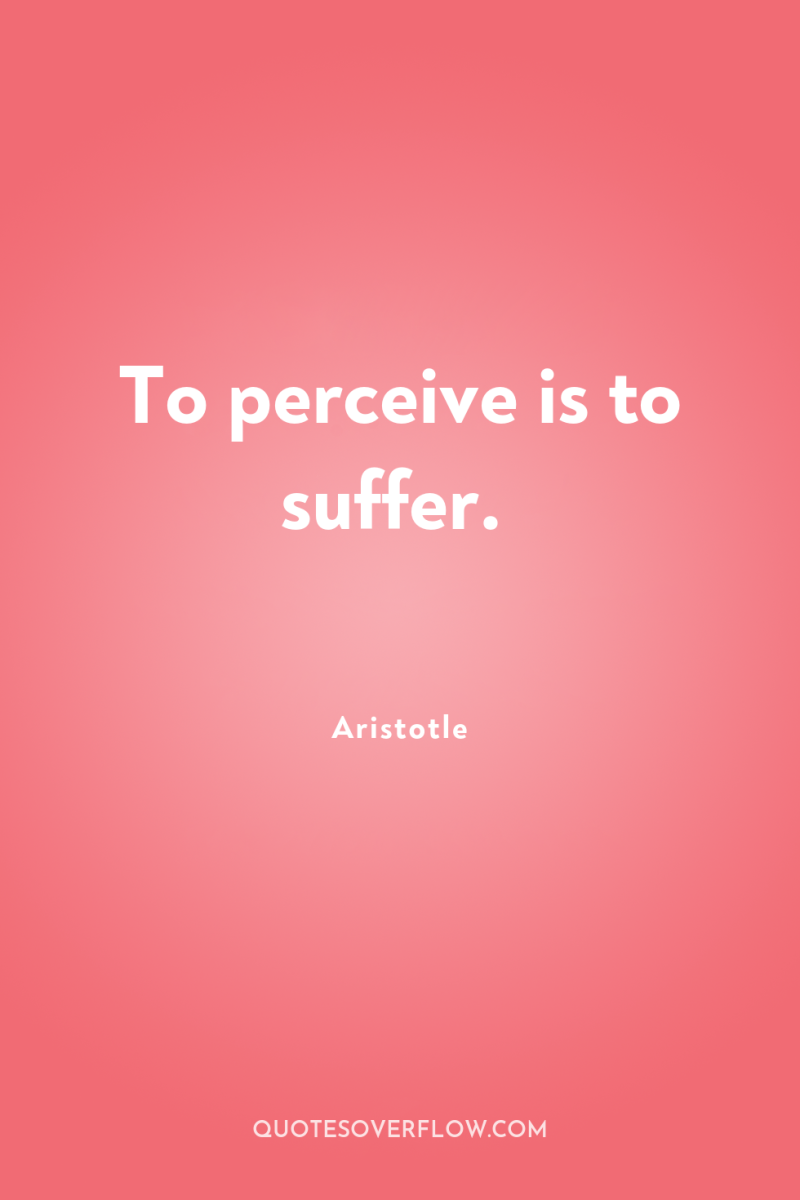
1
To perceive is to suffer.Aristotle
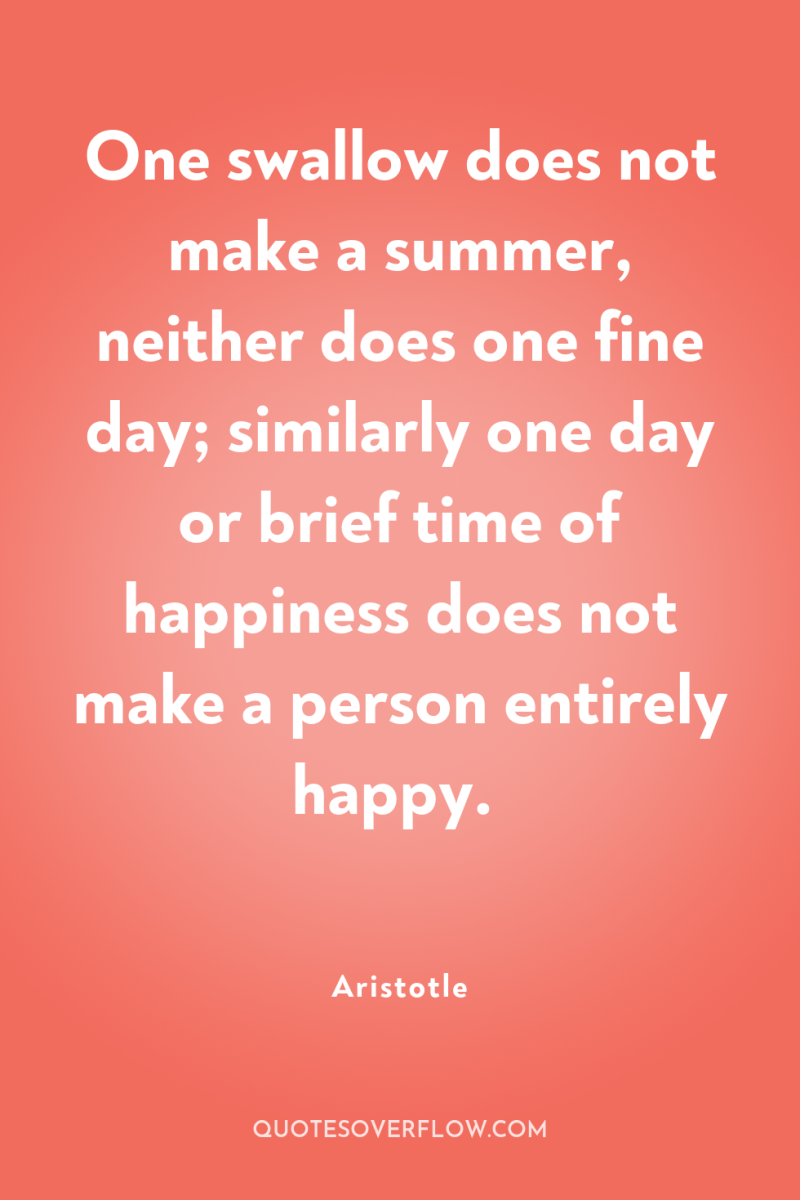
2
One swallow does not make a summer, neither does one fine day; similarly one day or brief time of happiness does not make a person entirely happy.Aristotle
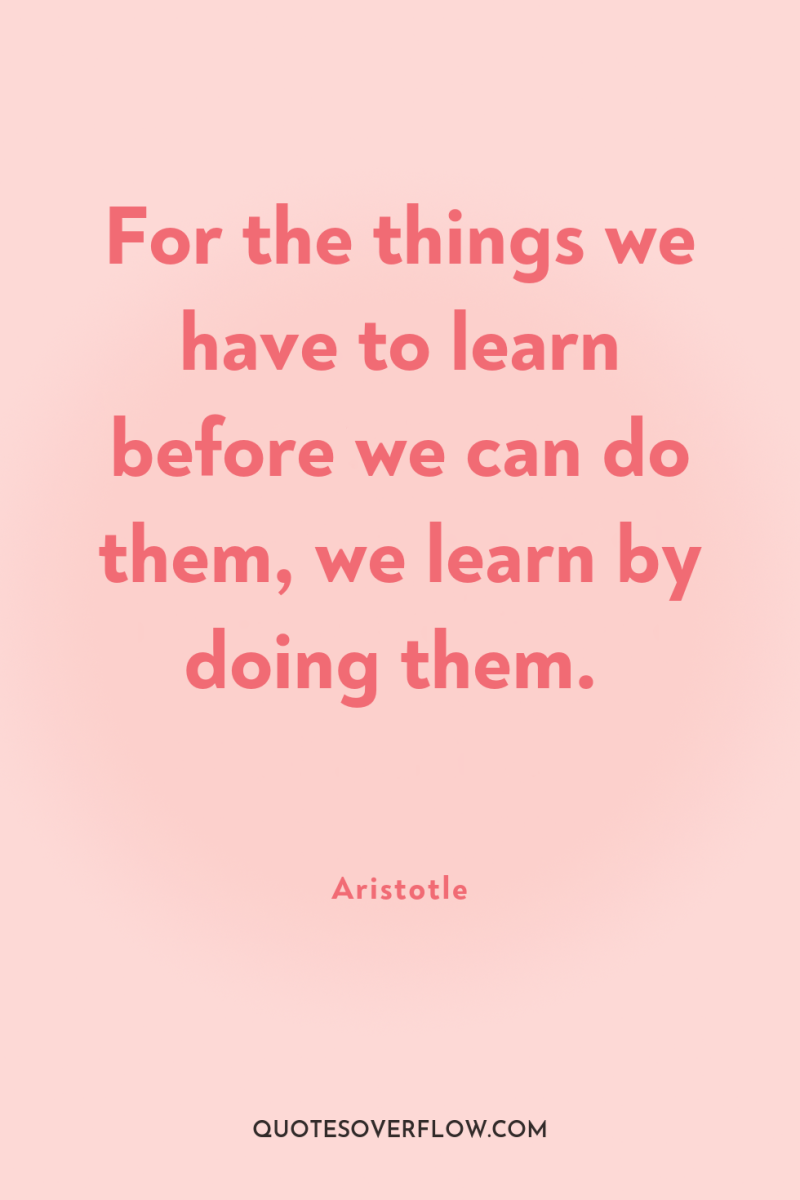
3
For the things we have to learn before we can do them, we learn by doing them.Aristotle
4
...happiness does not consist in amusement. In fact, it would be strange if our end were amusement, and if we were to labor and suffer hardships all our life long merely to amuse ourselves.... The happy life is regarded as a life in conformity with virtue. It is a life which involves effort and is not spent in amusement....Aristotle
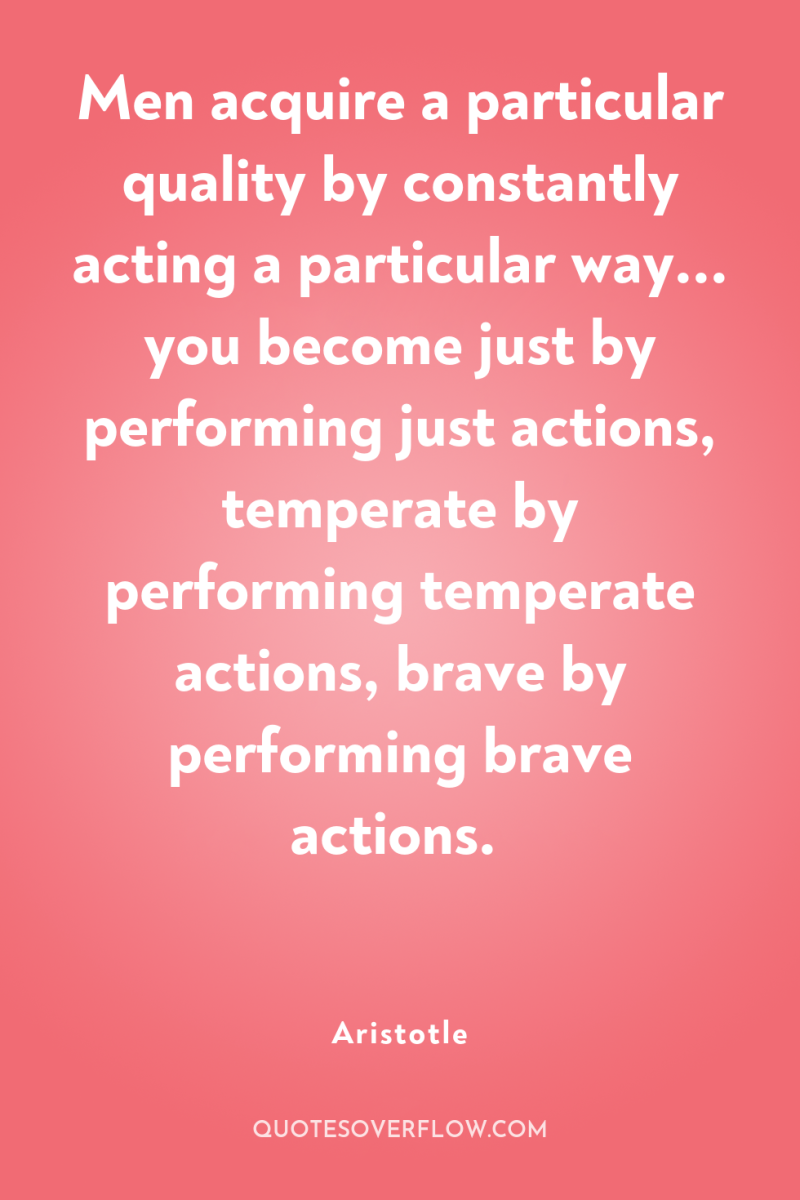
5
Men acquire a particular quality by constantly acting a particular way... you become just by performing just actions, temperate by performing temperate actions, brave by performing brave actions.Aristotle
6
Excellence is never an accident. It is always the result of high intention, sincere effort, and intelligent execution; it represents the wise choice of many alternatives - choice, not chance, determines your destiny.Aristotle
7
To write well, express yourself like the common people, but think like a wise man.Aristotle
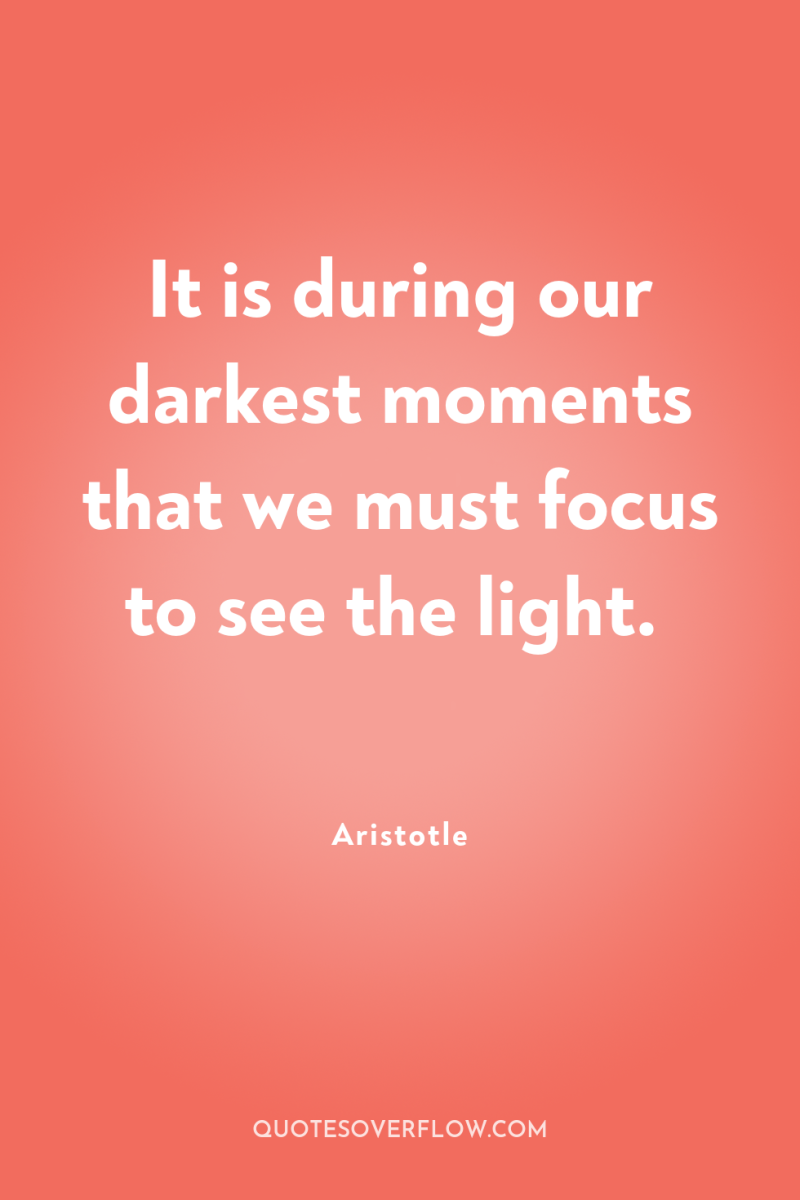
8
It is during our darkest moments that we must focus to see the light.Aristotle
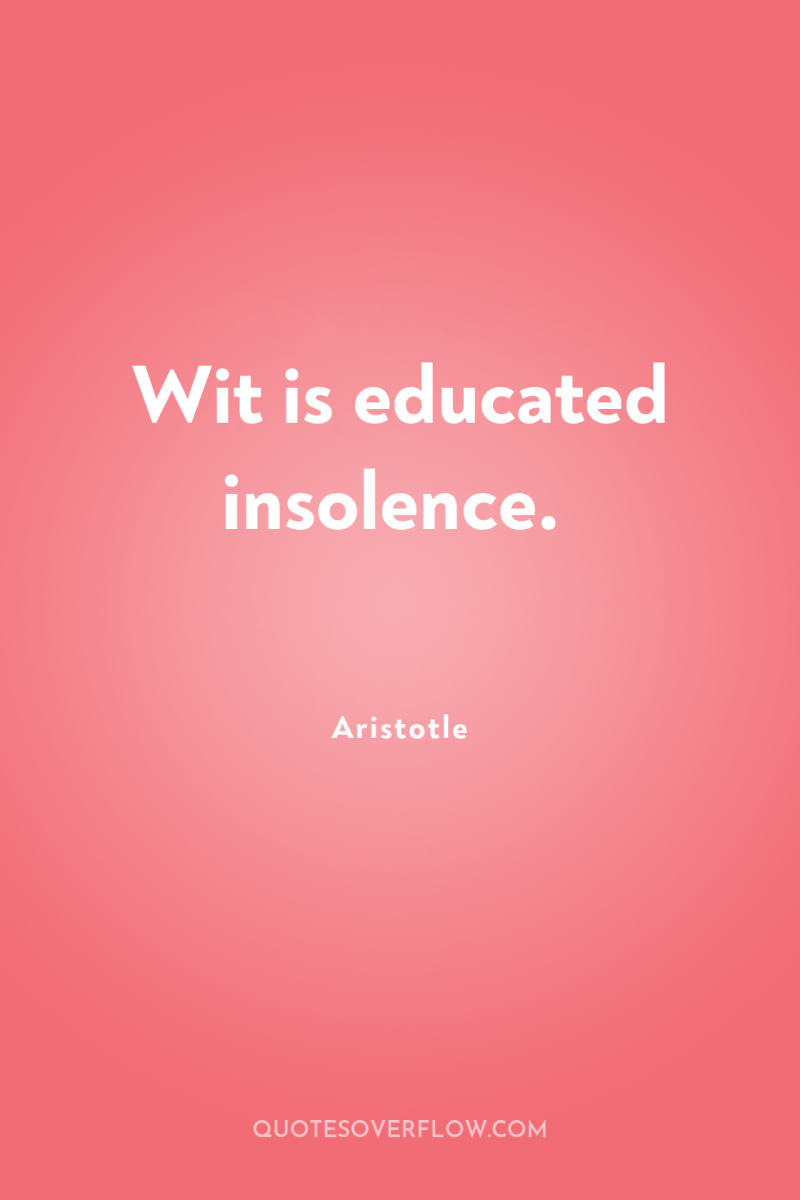
9
Wit is educated insolence.Aristotle
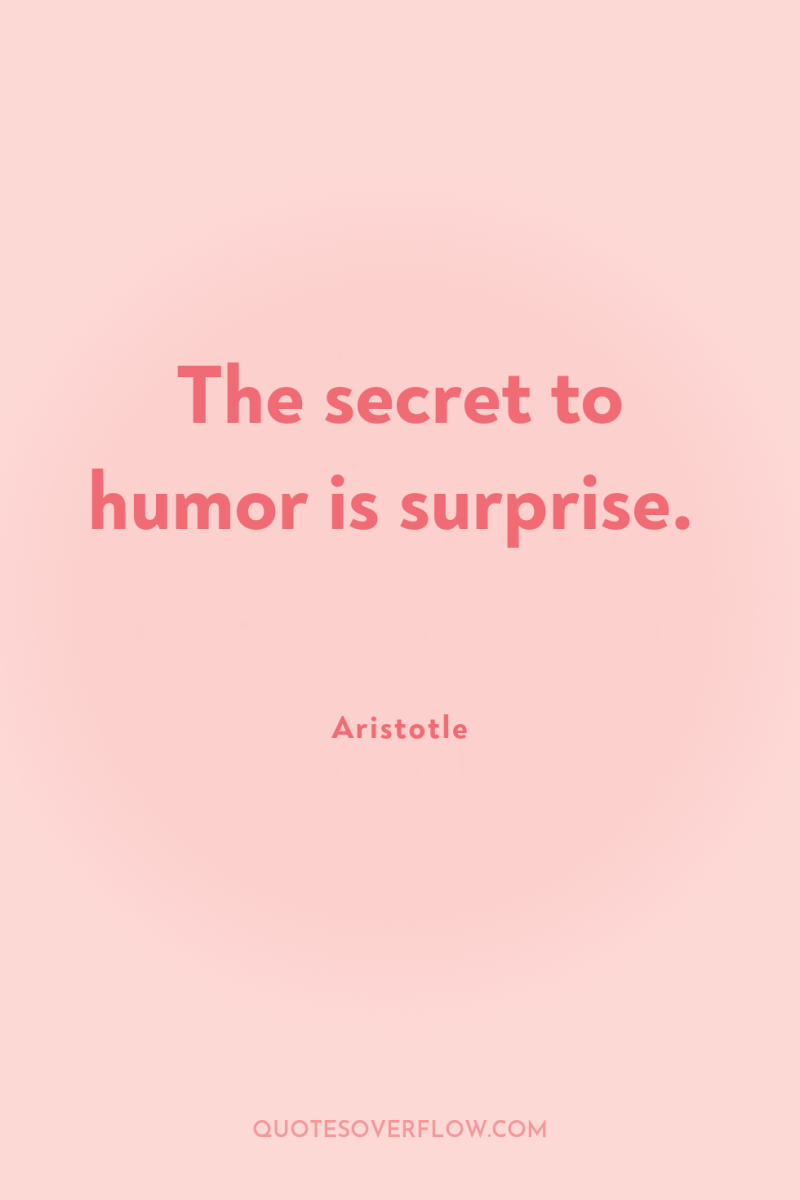
10
The secret to humor is surprise.Aristotle
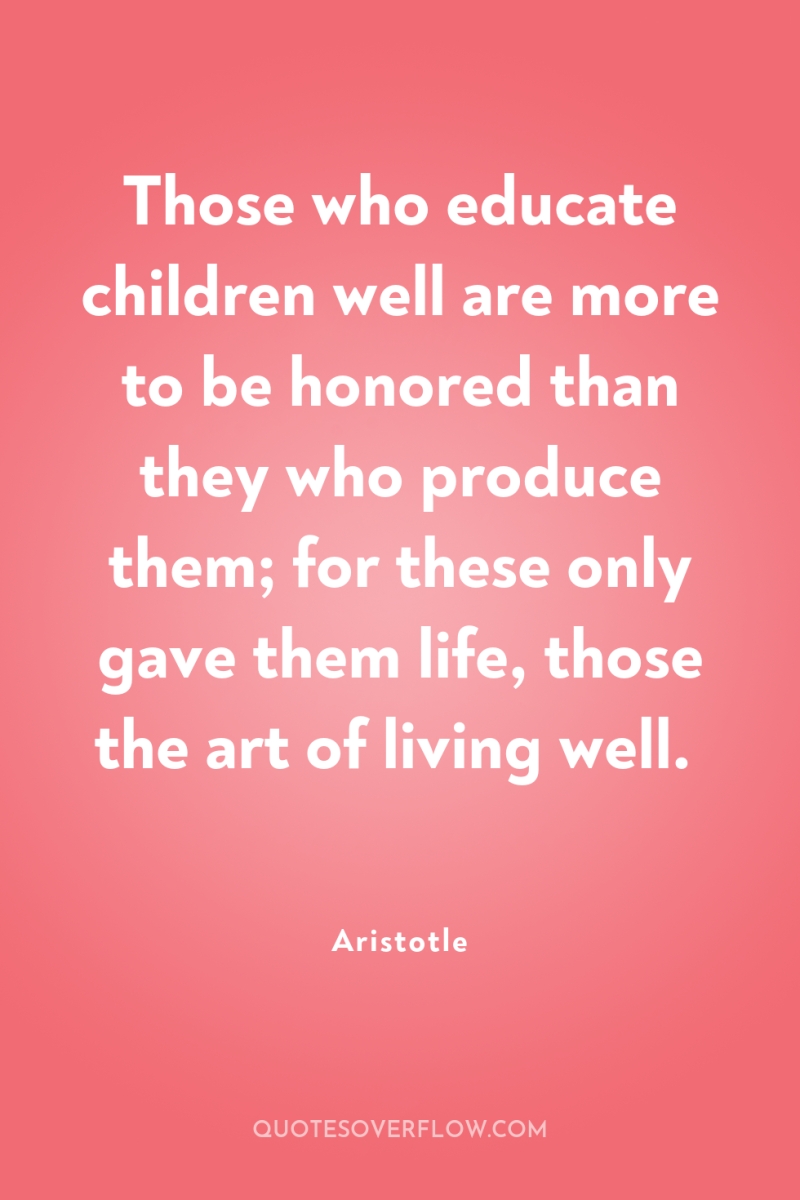
11
Those who educate children well are more to be honored than they who produce them; for these only gave them life, those the art of living well.Aristotle
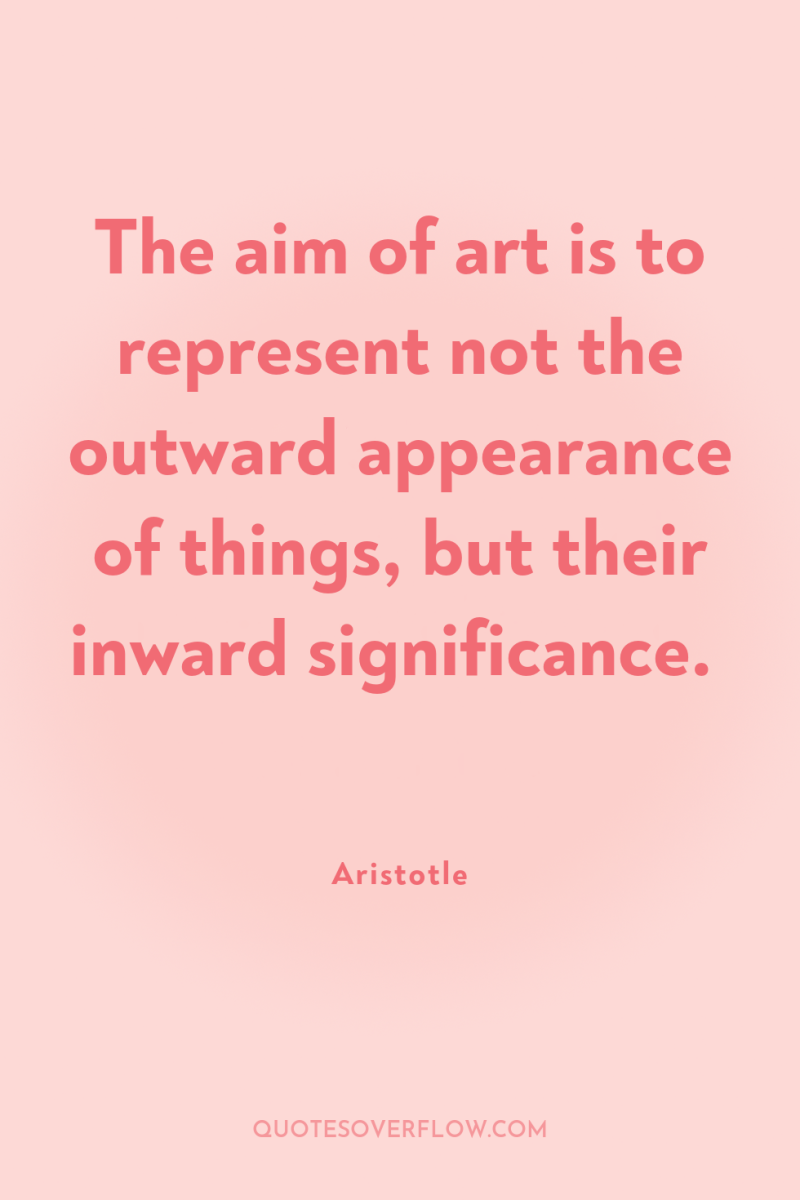
12
The aim of art is to represent not the outward appearance of things, but their inward significance.Aristotle
13
I have gained this by philosophy … I do without being ordered what some are constrained to do by their fear of the law.Aristotle

14
I count him braver who overcomes his desires than him who overcomes his enemies.Aristotle
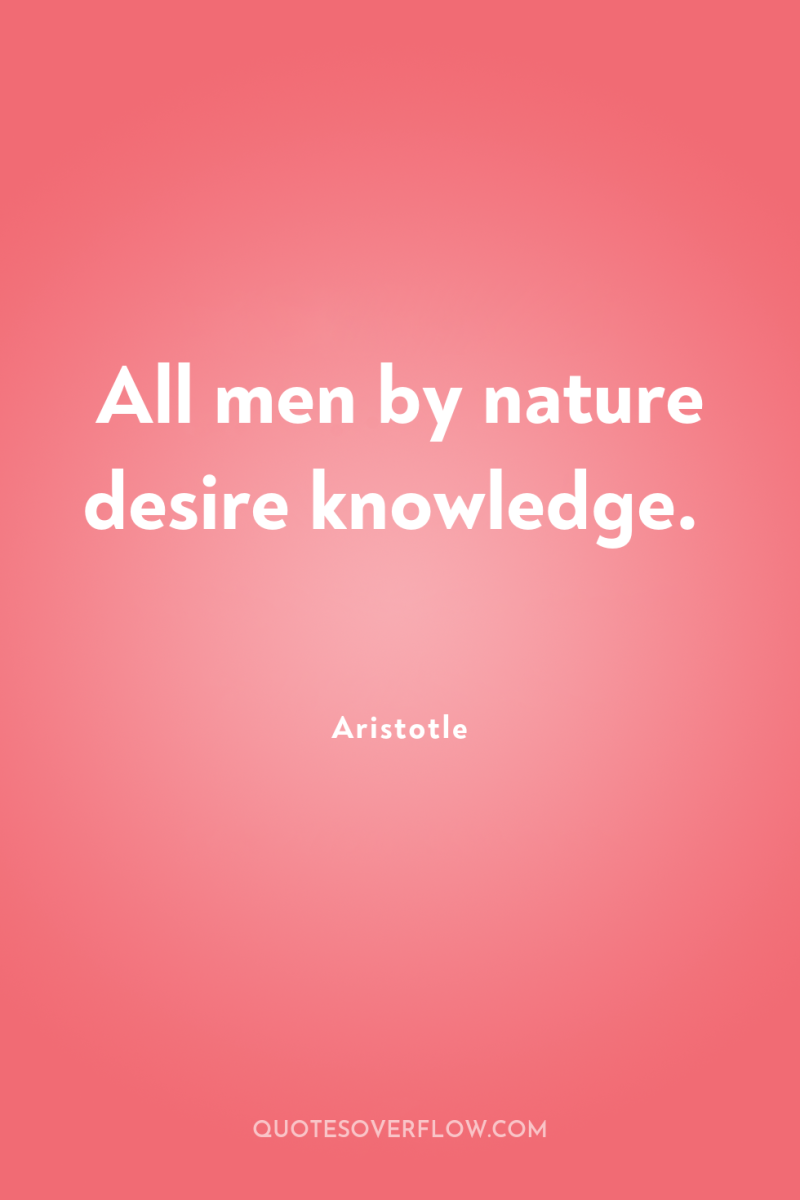
15
All men by nature desire knowledge.Aristotle
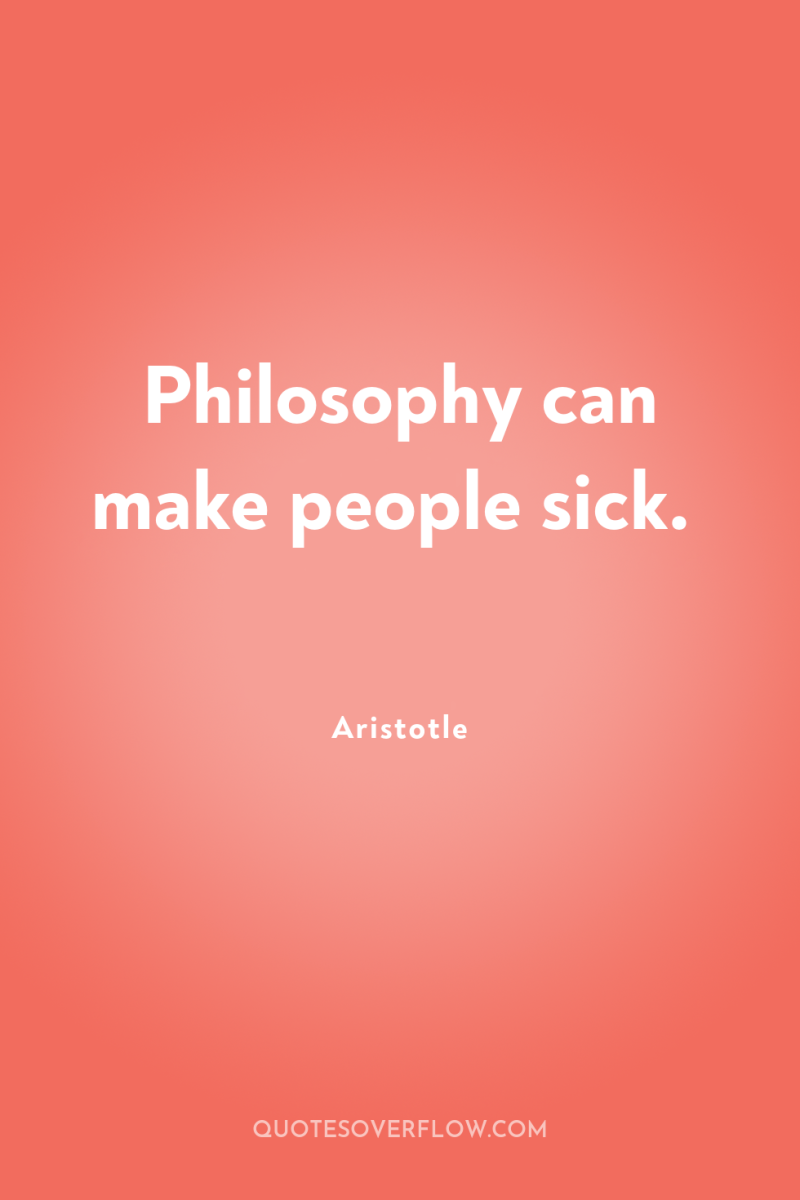
16
Philosophy can make people sick.Aristotle
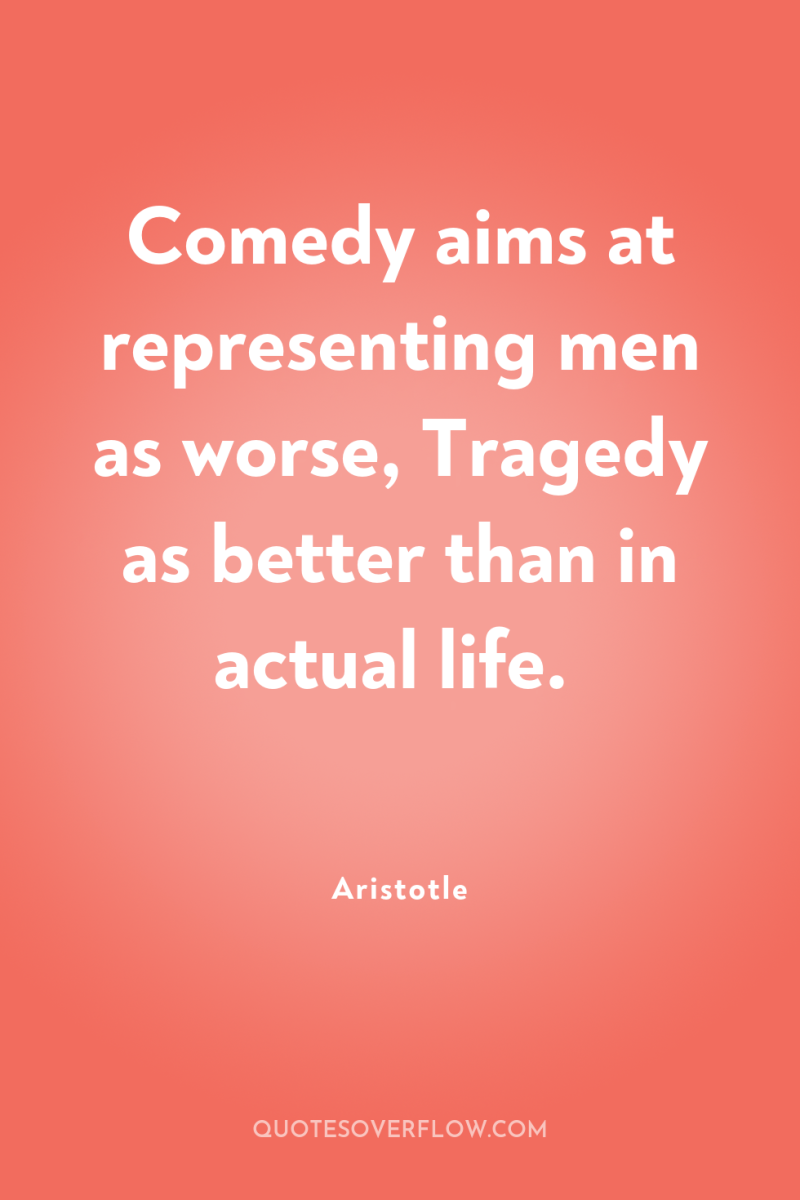
17
Comedy aims at representing men as worse, Tragedy as better than in actual life.Aristotle
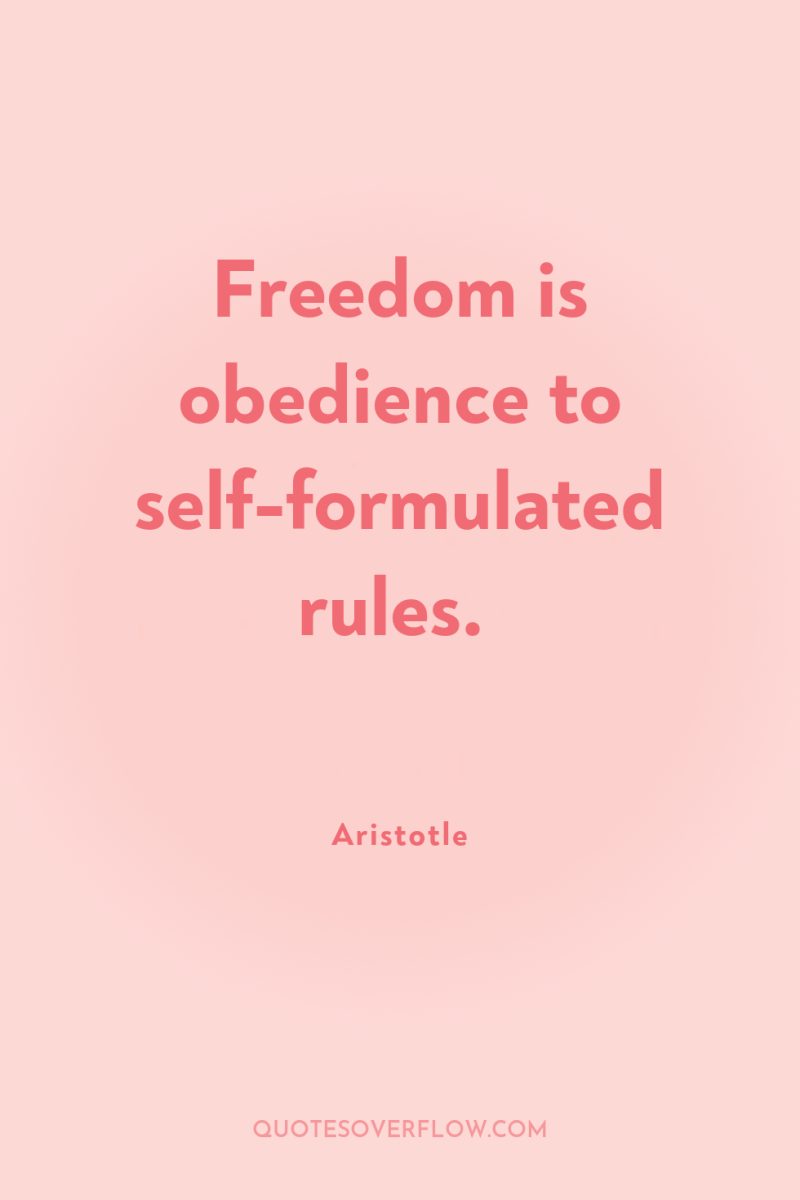
18
Freedom is obedience to self-formulated rules.Aristotle
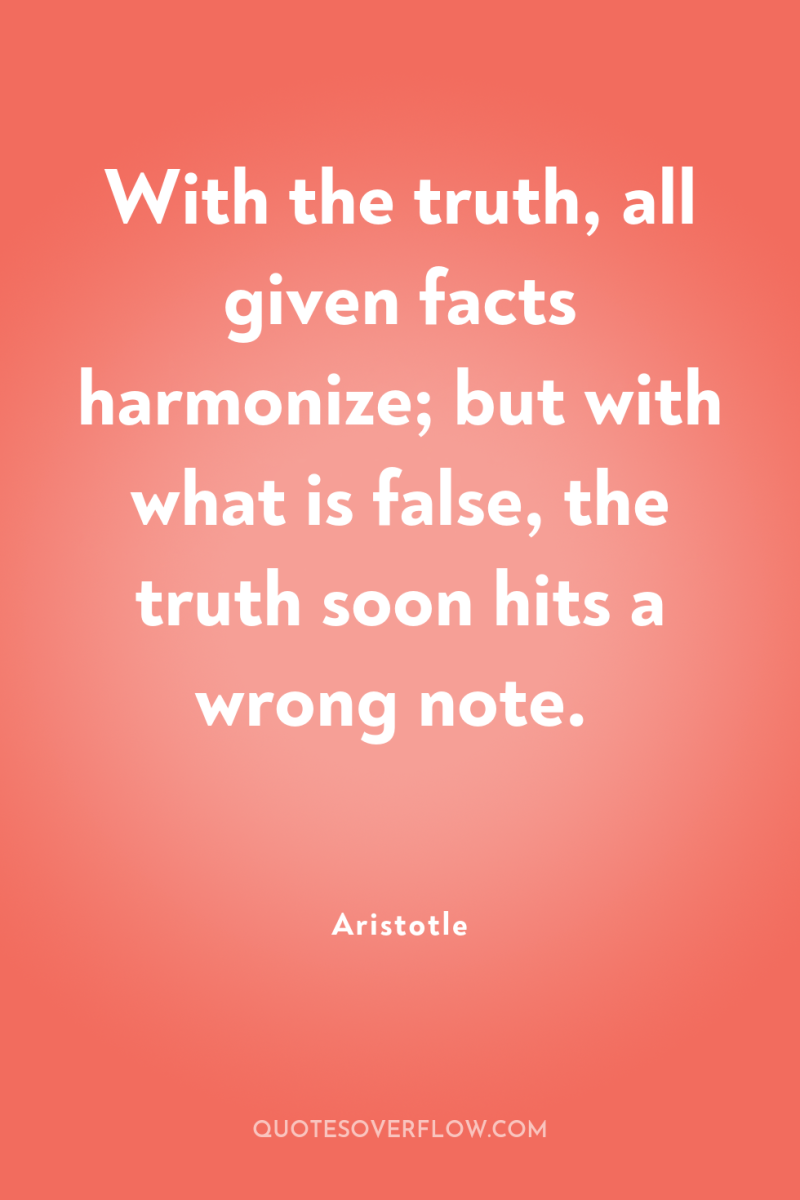
19
With the truth, all given facts harmonize; but with what is false, the truth soon hits a wrong note.Aristotle
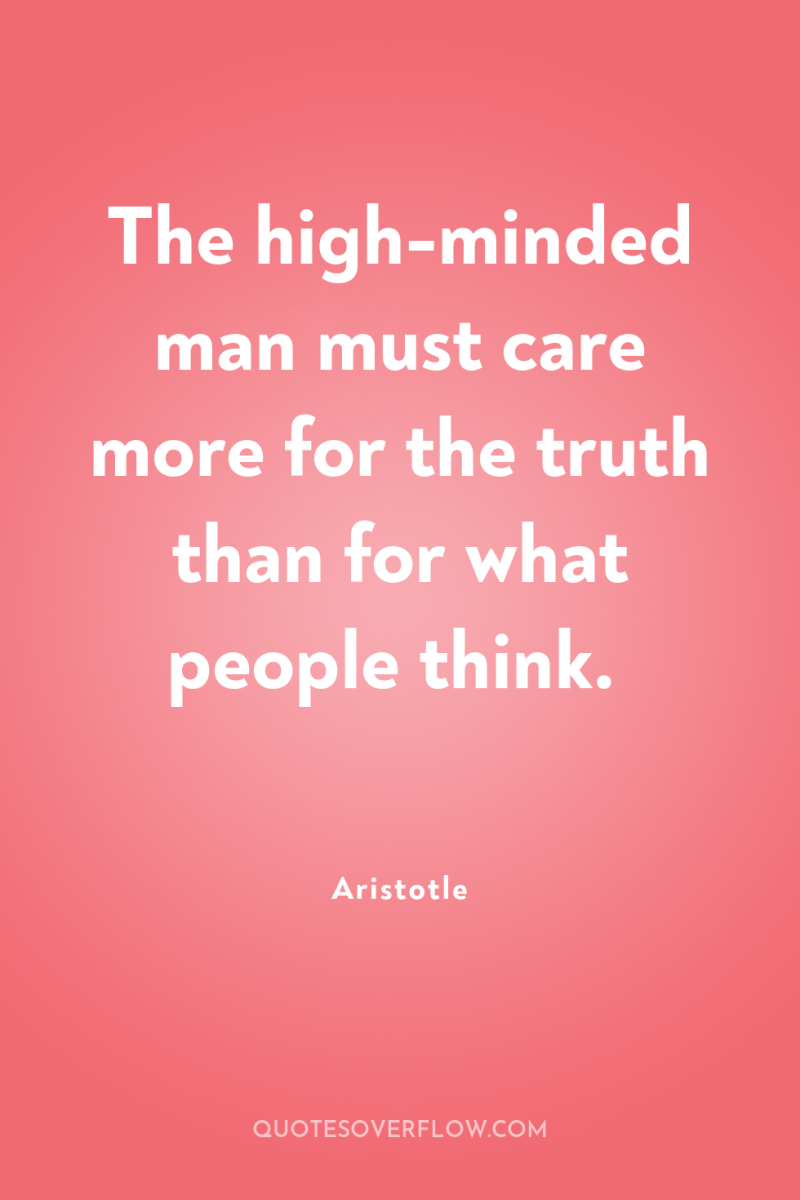
20
The high-minded man must care more for the truth than for what people think.Aristotle
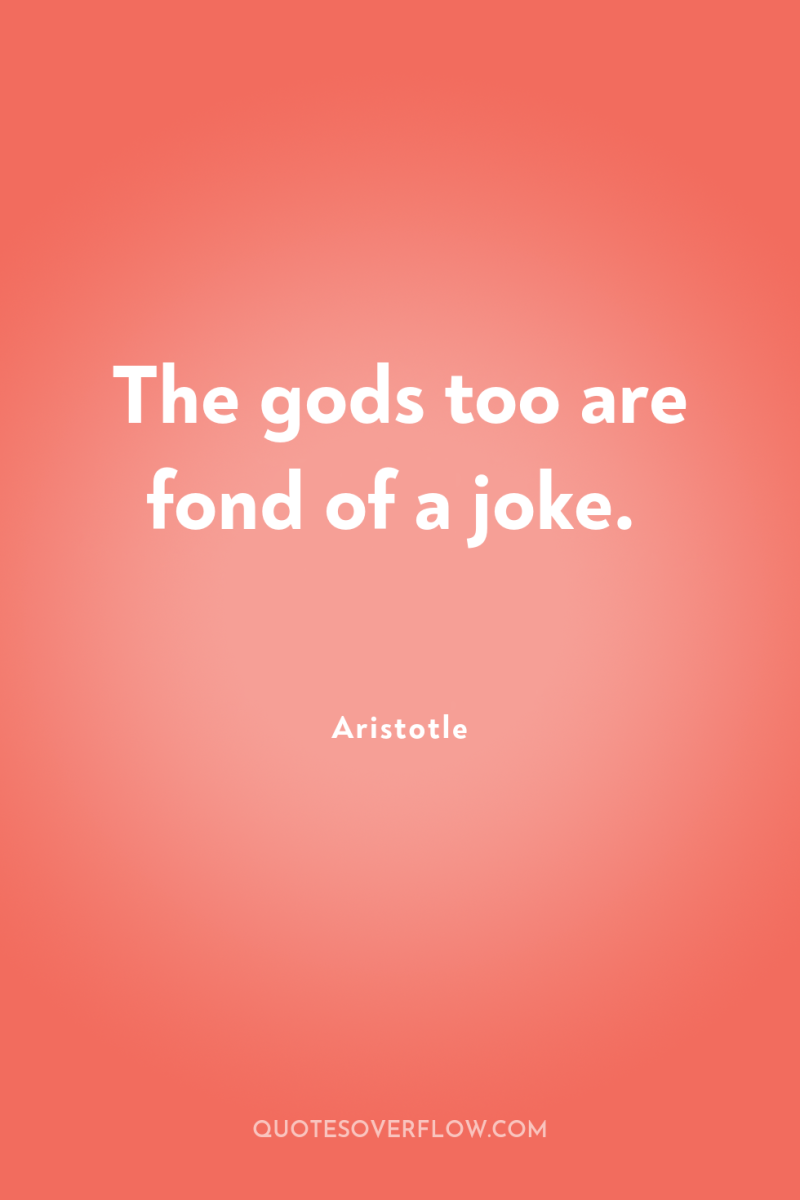
21
The gods too are fond of a joke.Aristotle
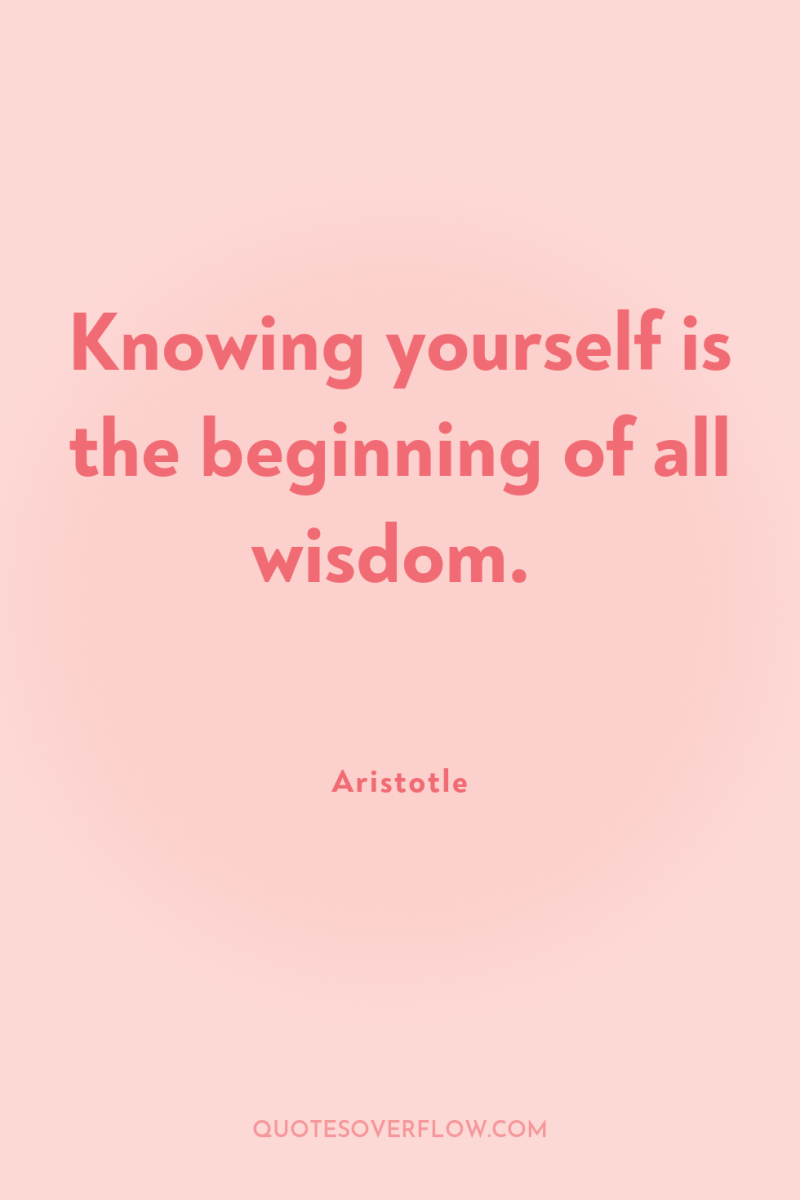
22
Knowing yourself is the beginning of all wisdom.Aristotle
23
It is the mark of an educated mind to be able to entertain a thought without accepting it.Aristotle
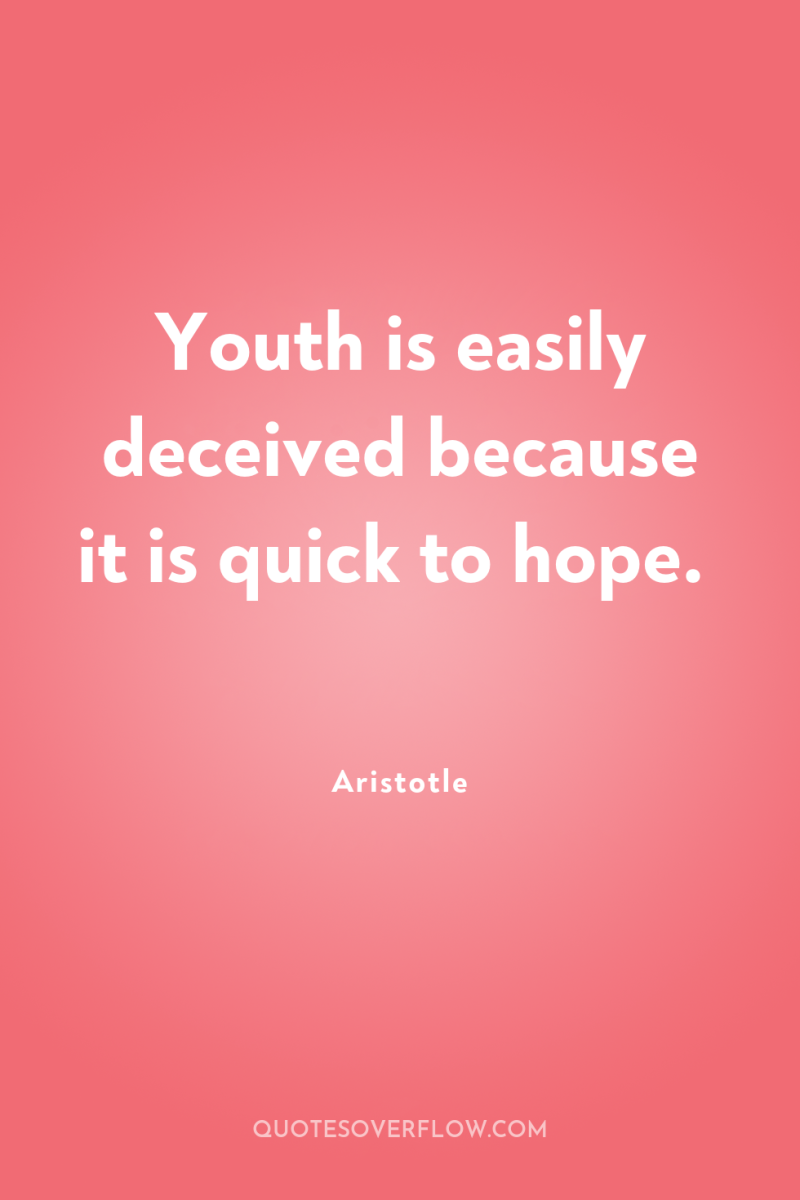
24
Youth is easily deceived because it is quick to hope.Aristotle
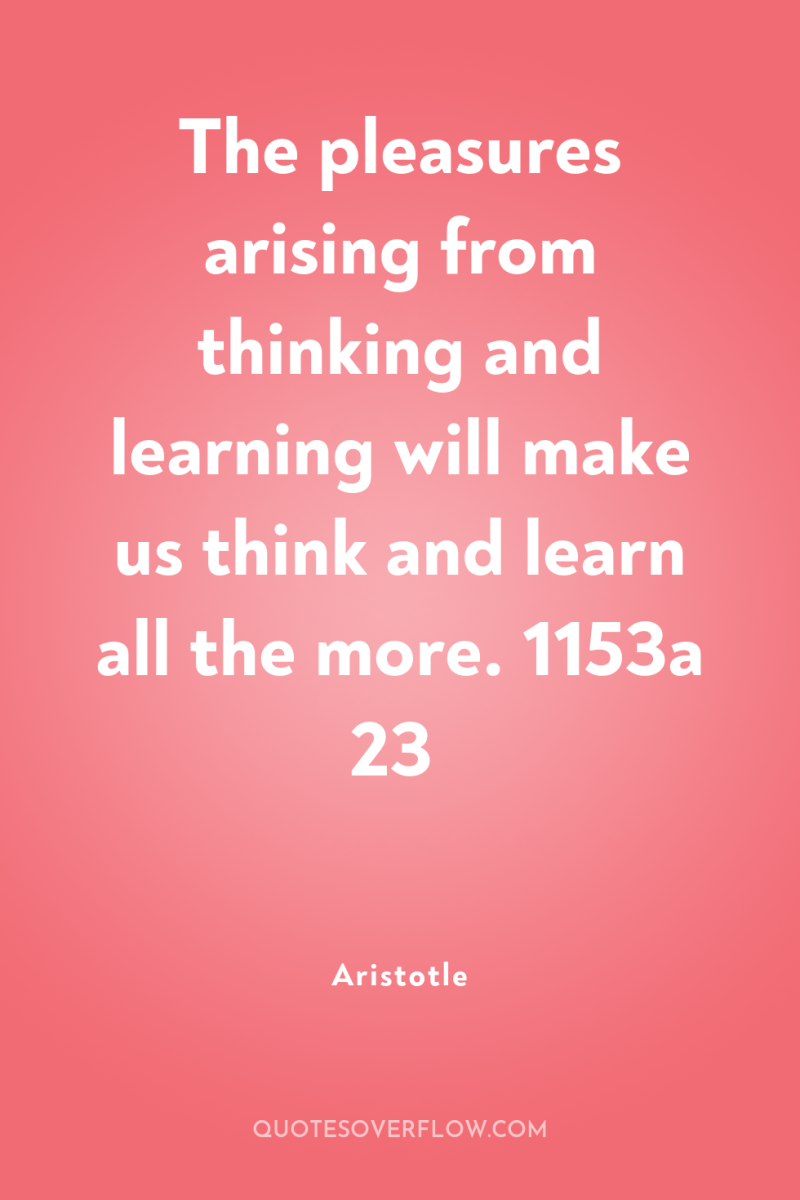
25
The pleasures arising from thinking and learning will make us think and learn all the more. 1153a 23Aristotle
26
Happiness depends upon ourselves.Aristotle
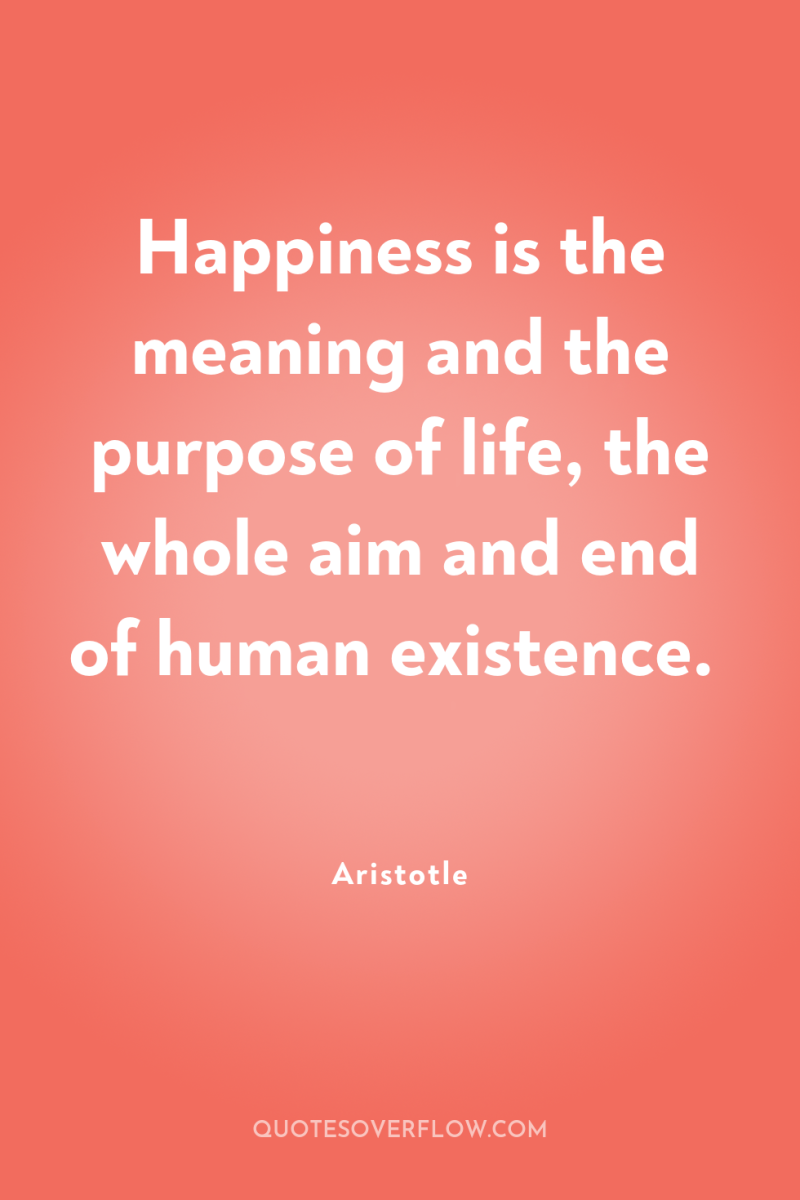
27
Happiness is the meaning and the purpose of life, the whole aim and end of human existence.Aristotle
28
Happiness is a state of activity.Aristotle
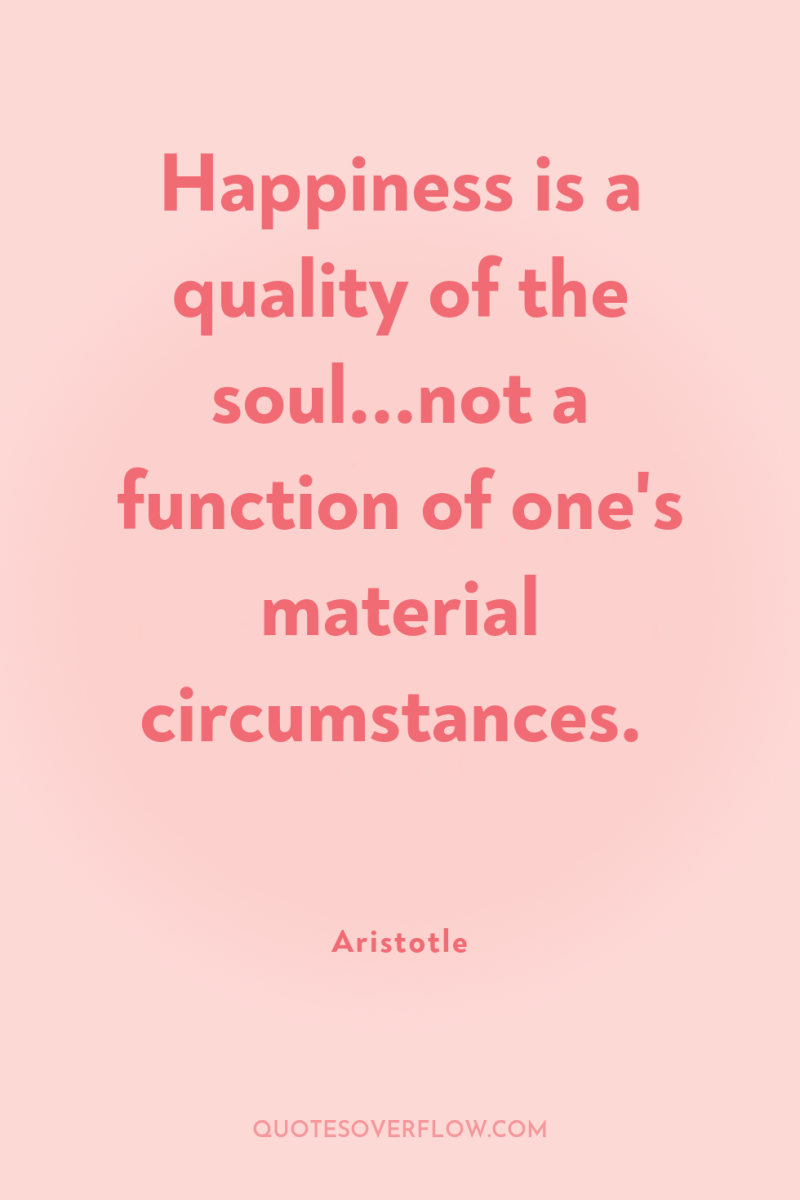
29
Happiness is a quality of the soul...not a function of one's material circumstances.Aristotle
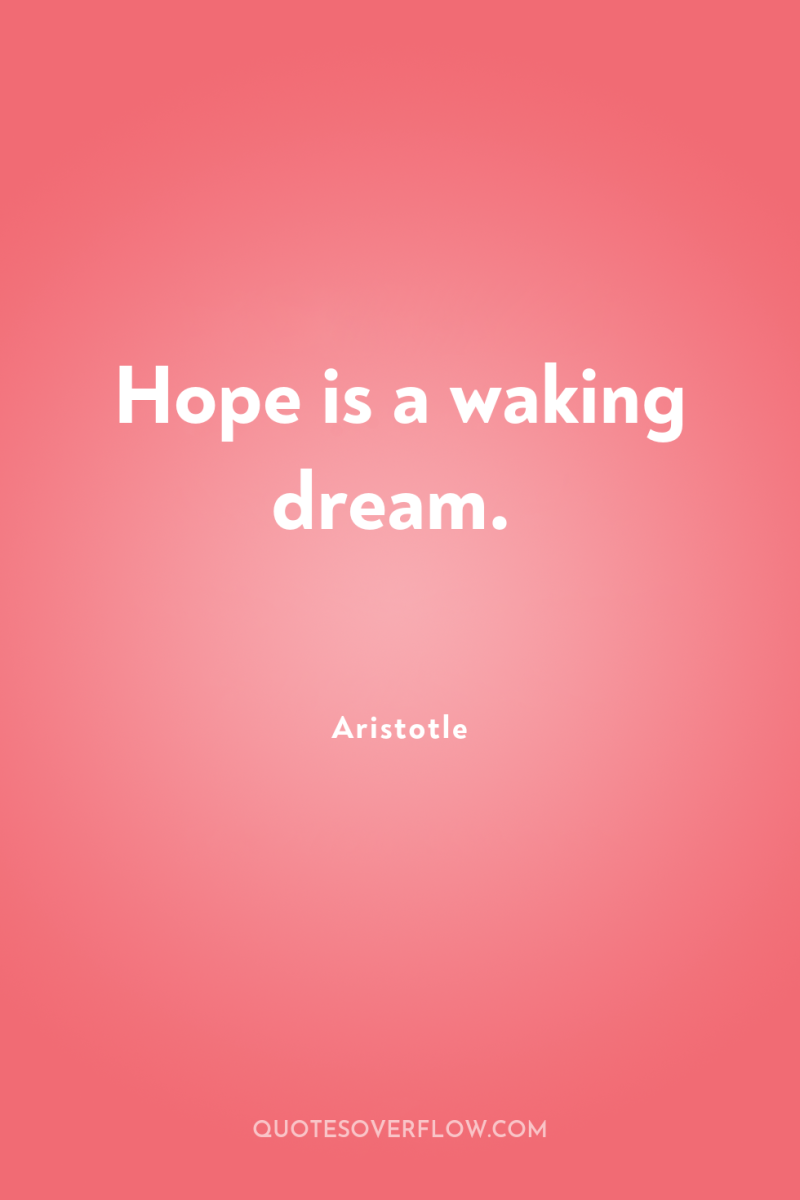
30
Hope is a waking dream.Aristotle
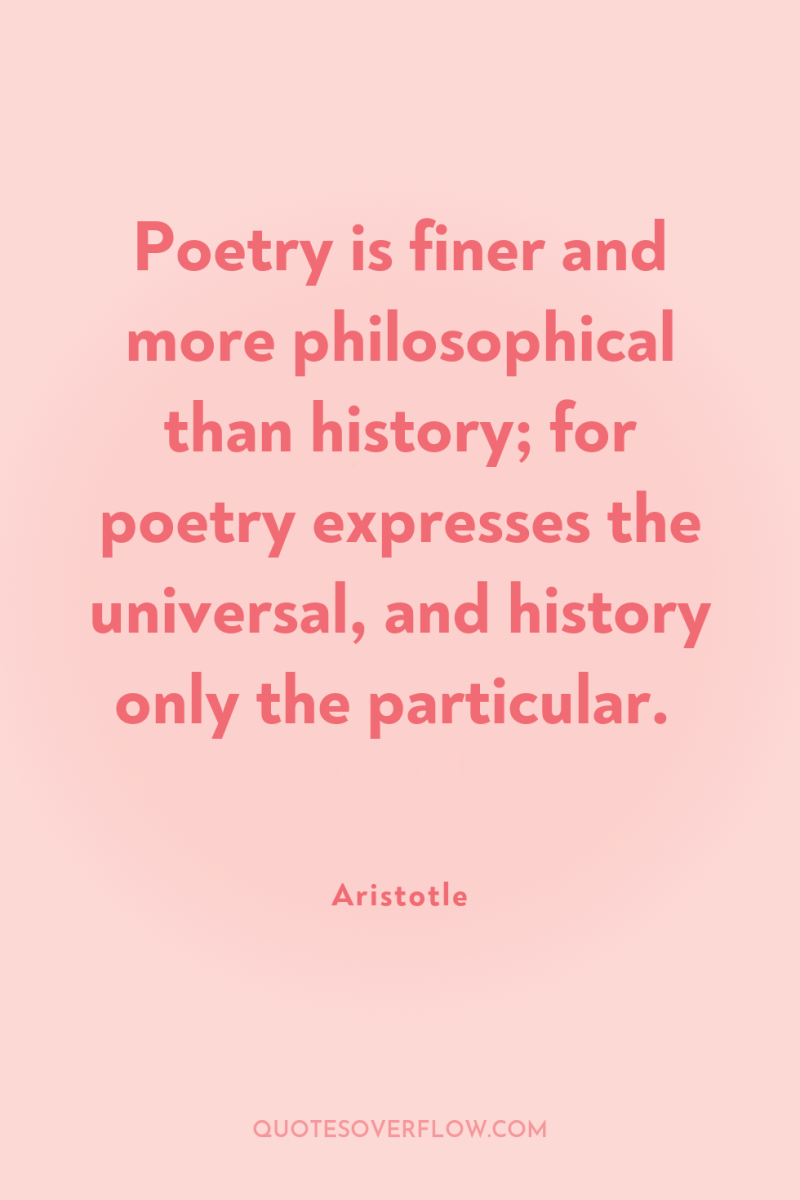
31
Poetry is finer and more philosophical than history; for poetry expresses the universal, and history only the particular.Aristotle
32
A tyrant must put on the appearance of uncommon devotion to religion. Subjects are less apprehensive of illegal treatment from a ruler whom they consider god-fearing and pious. On the other hand, they do less easily move against him, believing that he has the gods on his side.Aristotle
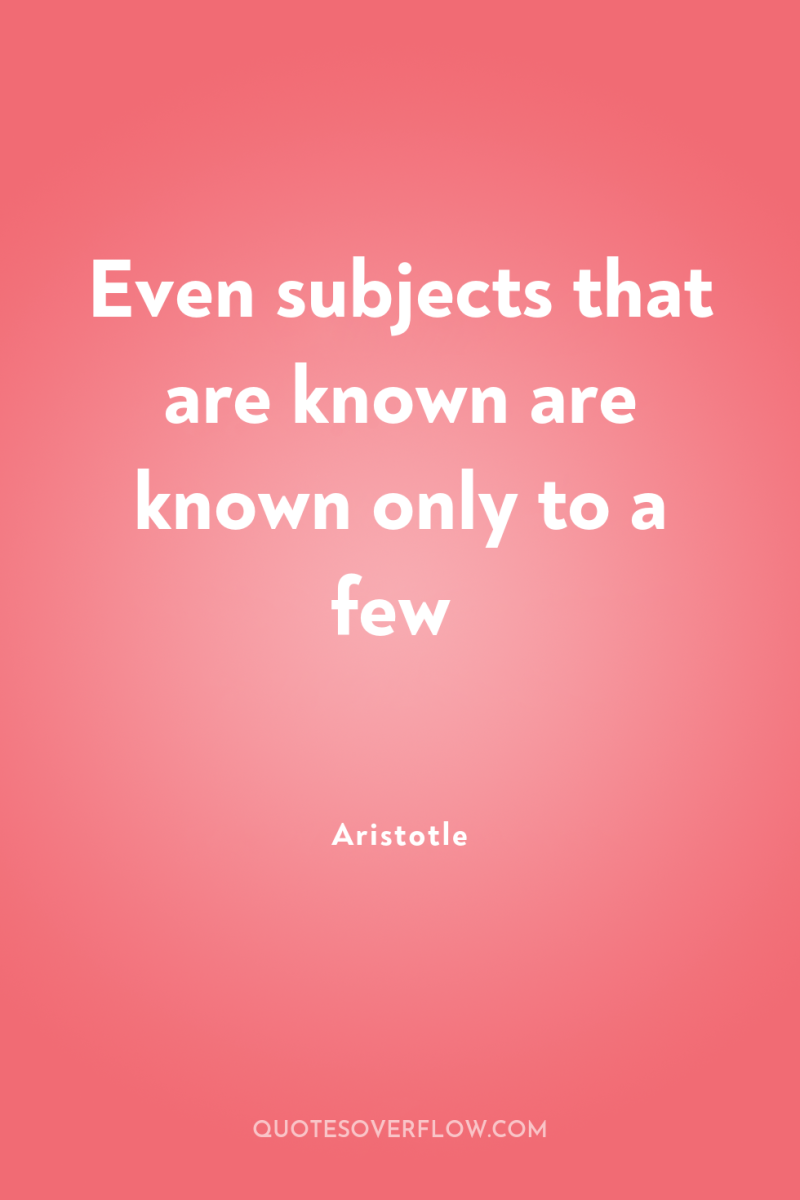
33
Even subjects that are known are known only to a fewAristotle
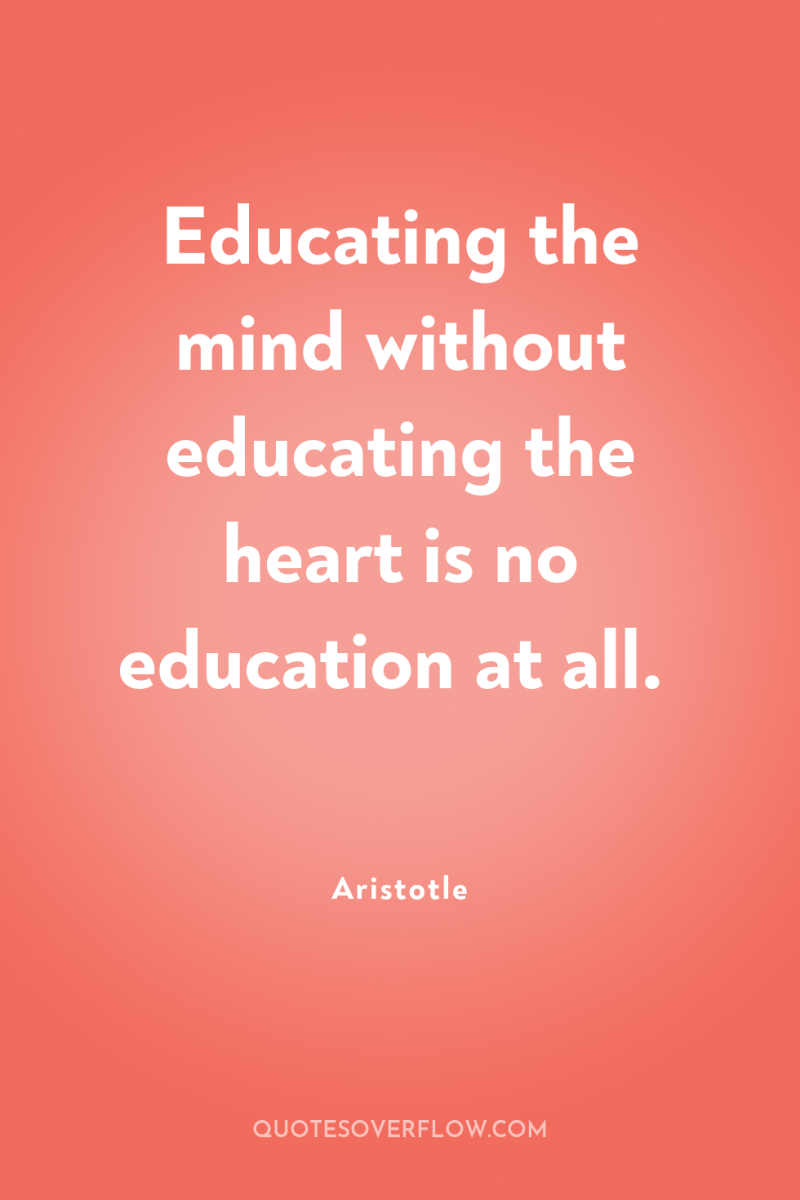
34
Educating the mind without educating the heart is no education at all.Aristotle
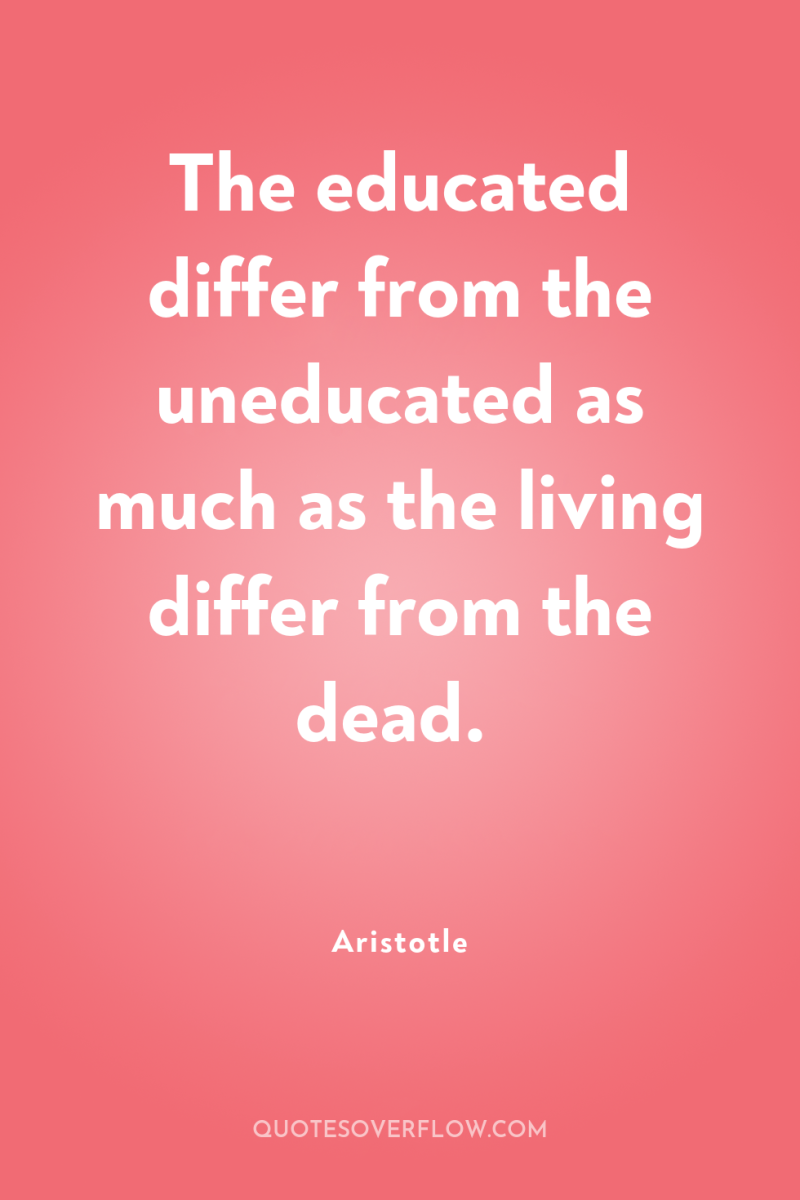
35
The educated differ from the uneducated as much as the living differ from the dead.Aristotle
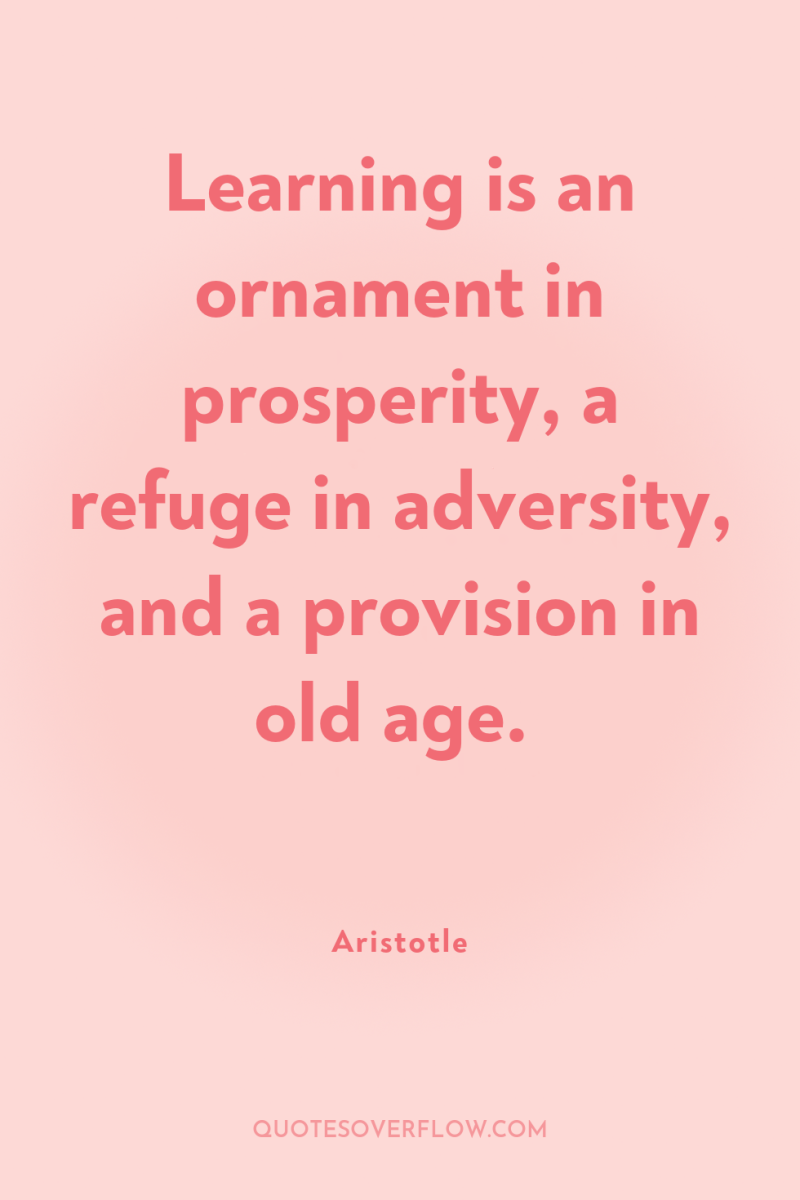
36
Learning is an ornament in prosperity, a refuge in adversity, and a provision in old age.Aristotle

37
Adventure is worthwhile.Aristotle
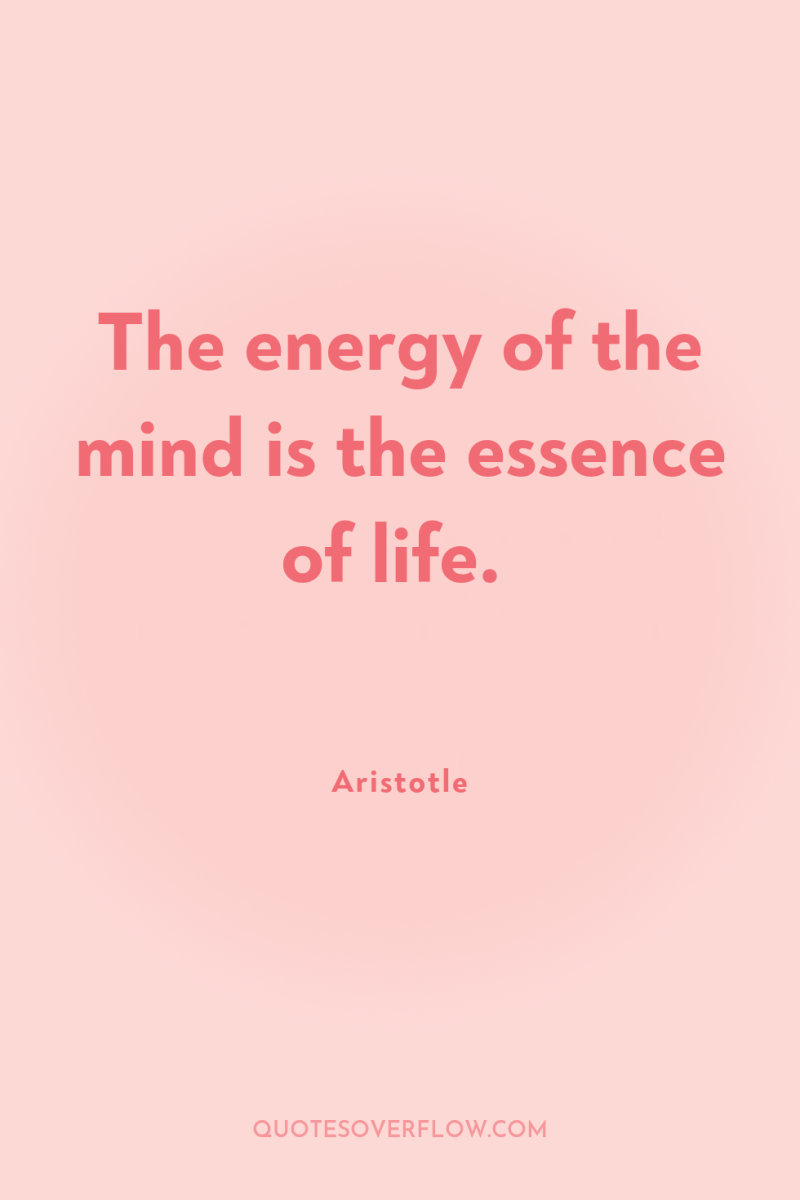
38
The energy of the mind is the essence of life.Aristotle
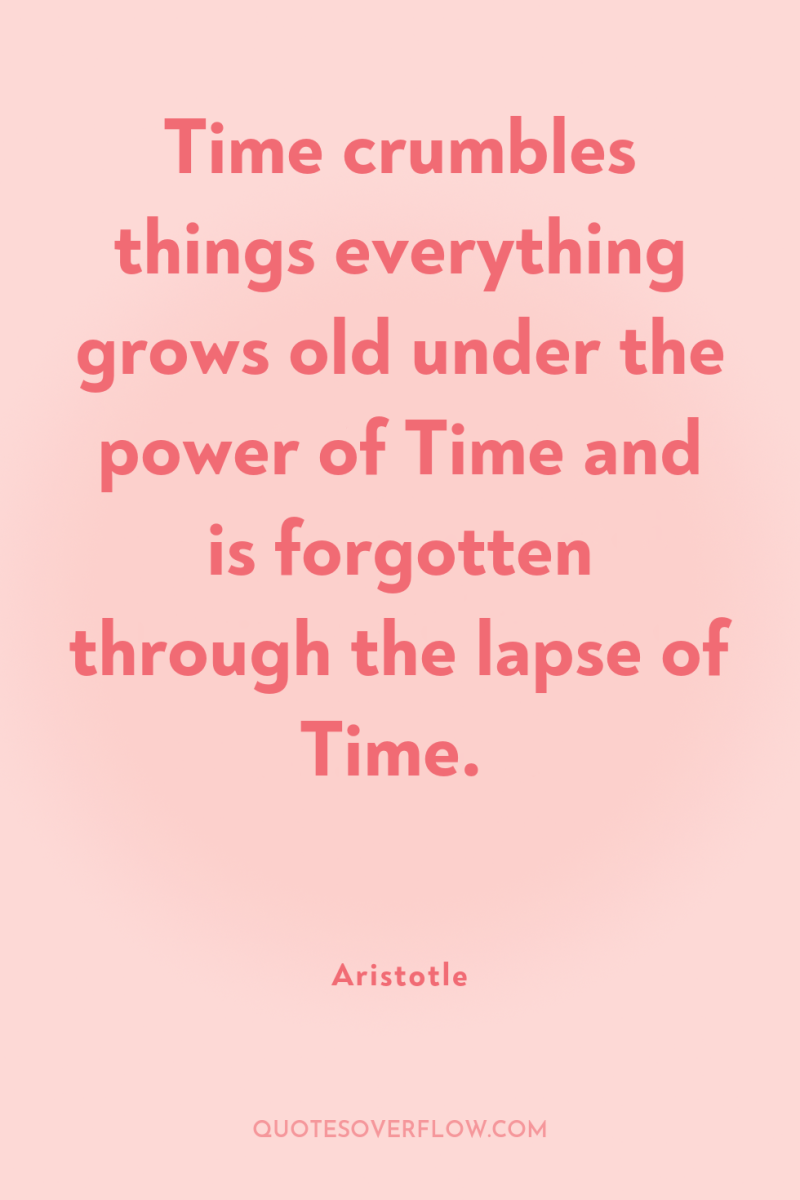
39
Time crumbles things everything grows old under the power of Time and is forgotten through the lapse of Time.Aristotle
40
The void is 'not-being, ' and no part of 'what is' is a 'not-being, '; for what 'is' in the strict sense of the term is an absolute plenum. This plenum, however, is not 'one': on the contrary, it is a 'many' infinite in number and invisible owing to the minuteness of their bulk.Aristotle

41
All Earthquakes and Disasters are warnings there’s too much corruption in the worldAristotle

42
He who has overcome his fears will truly be free.Aristotle
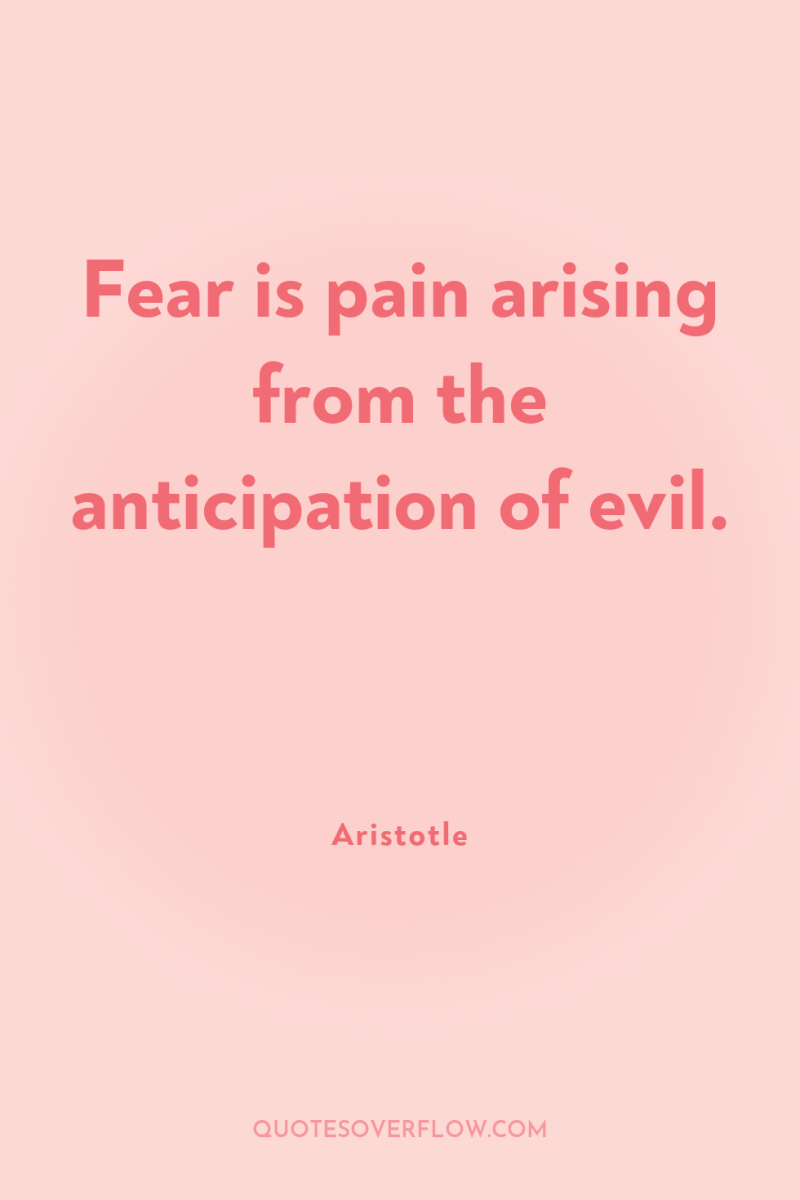
43
Fear is pain arising from the anticipation of evil.Aristotle
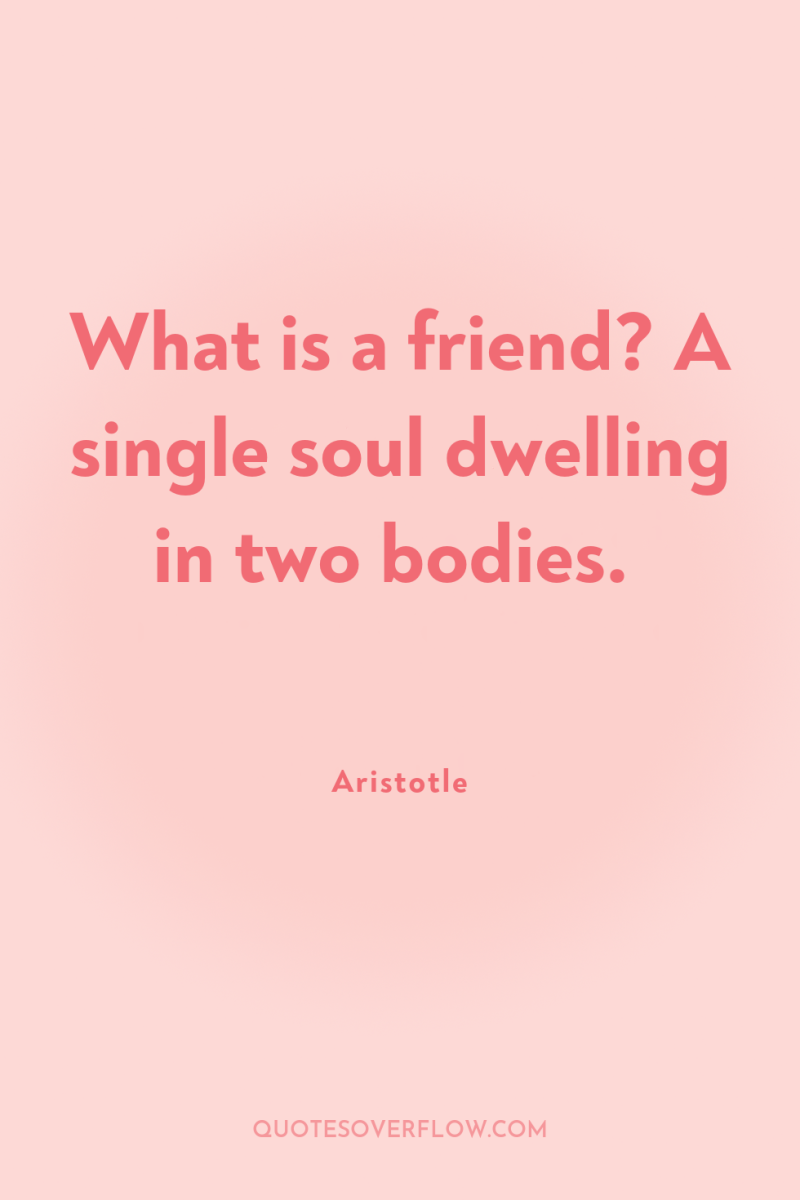
44
What is a friend? A single soul dwelling in two bodies.Aristotle
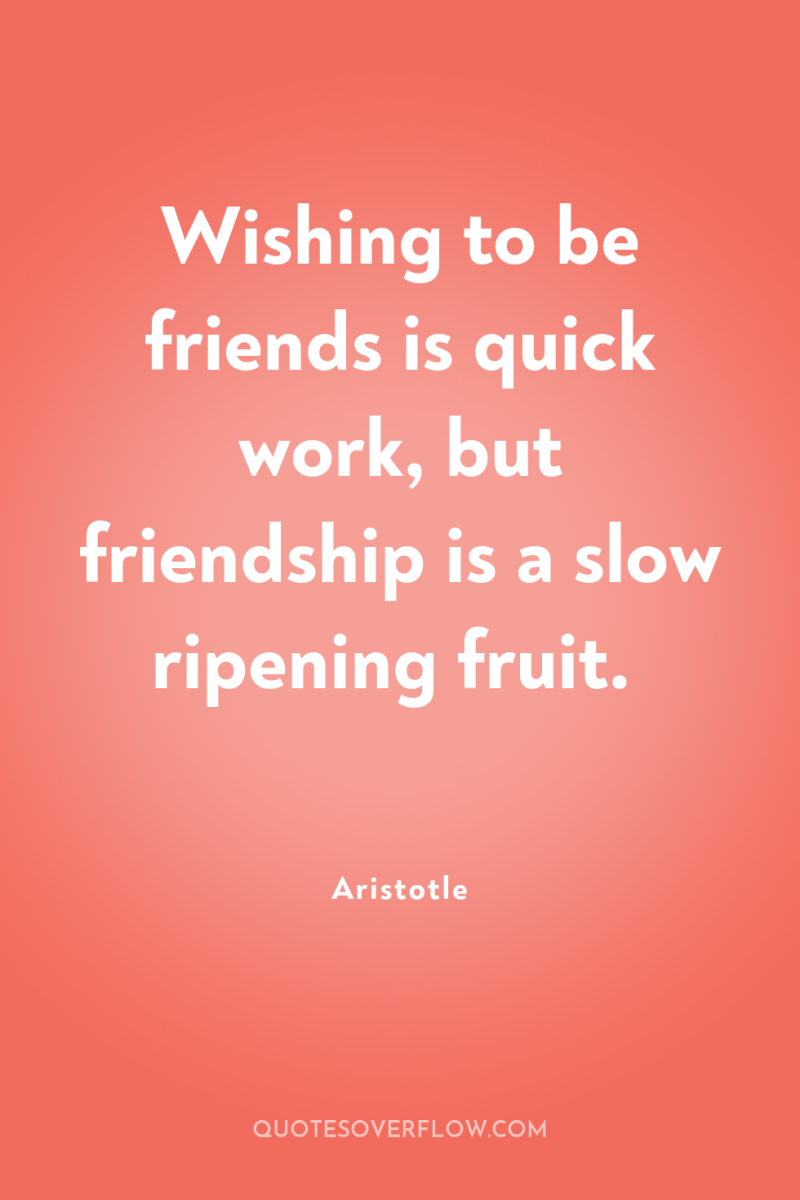
45
Wishing to be friends is quick work, but friendship is a slow ripening fruit.Aristotle
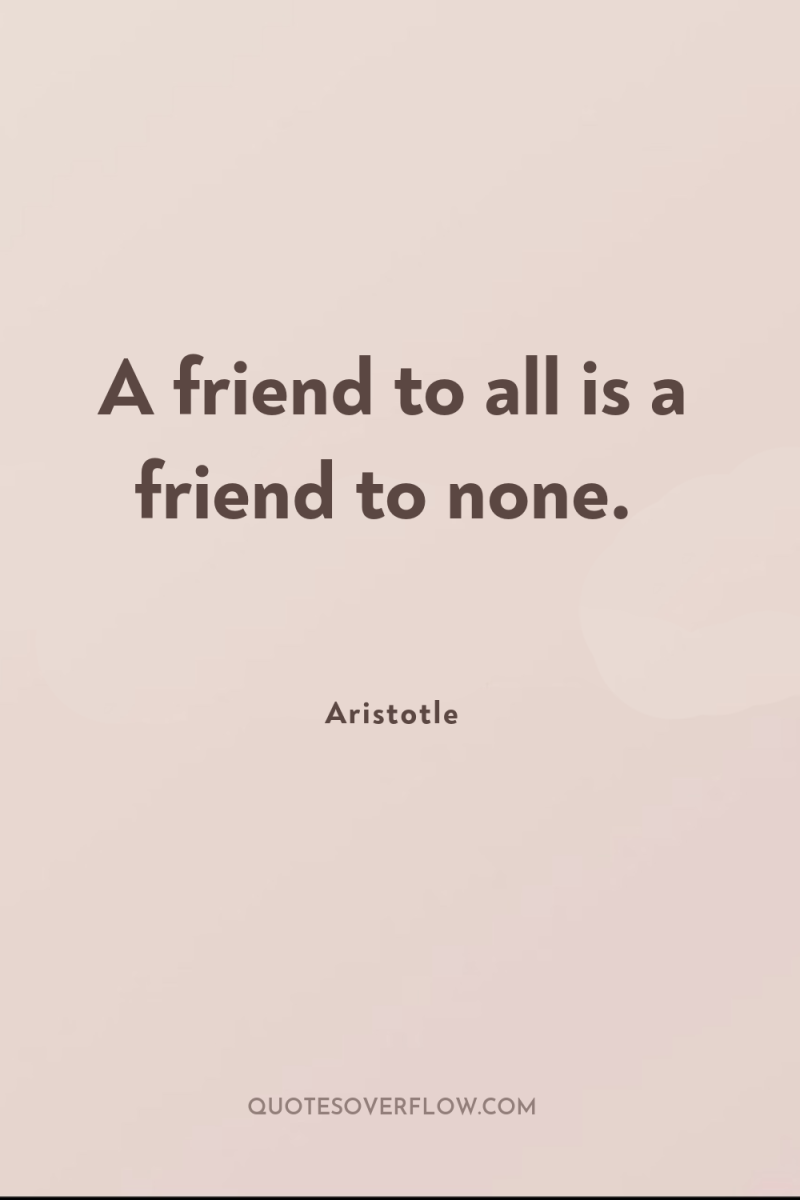
46
A friend to all is a friend to none.Aristotle
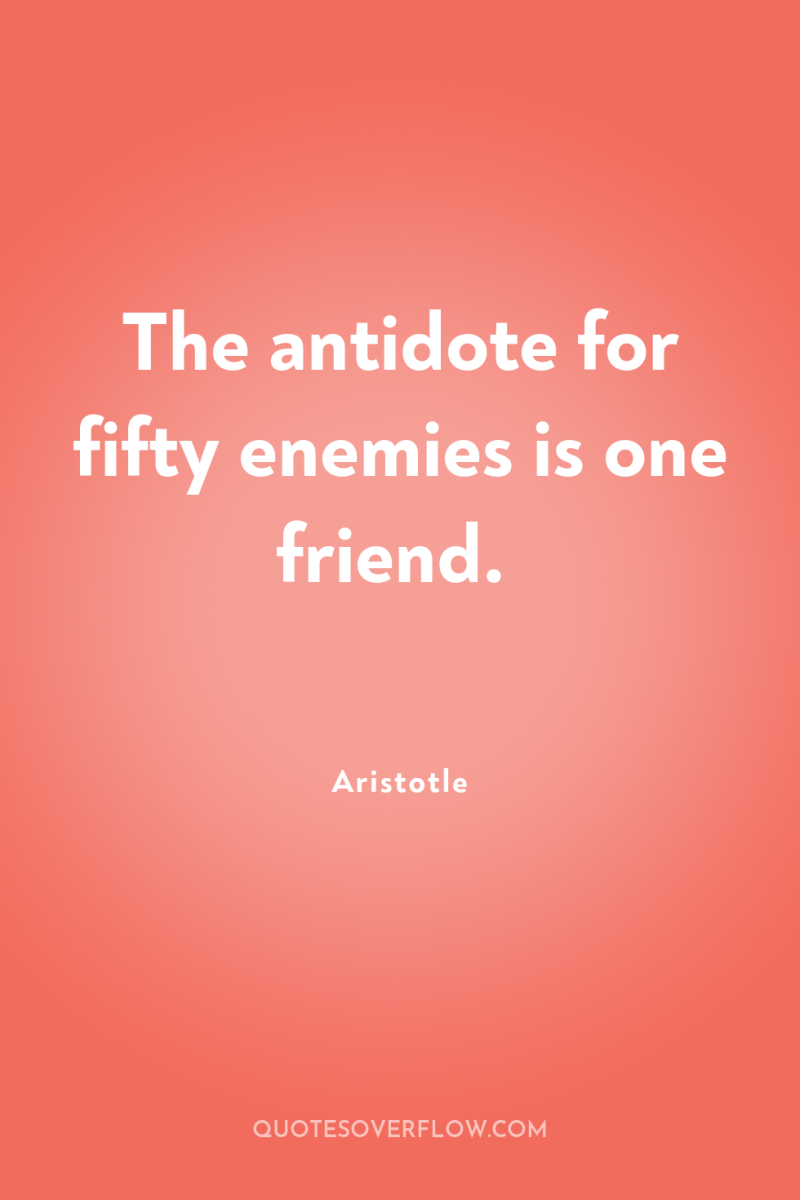
47
The antidote for fifty enemies is one friend.Aristotle
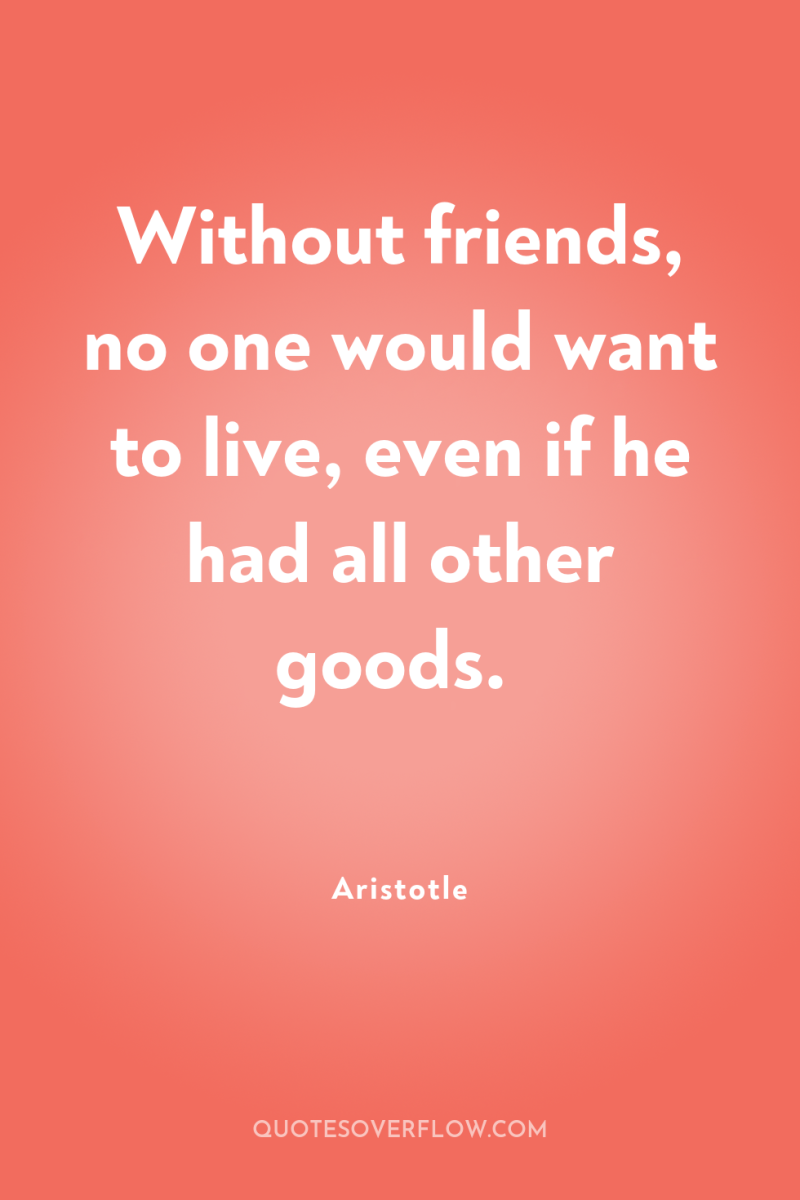
48
Without friends, no one would want to live, even if he had all other goods.Aristotle
49
What is evil neither can nor should be loved; for it is not one’s duty to be a lover of evil or to become like what is bad; and we have said that like is dear to like. Must the friendship, then, be forthwith broken off? Or is this not so in all cases, but only when one’s friends are incurable in their wickedness? If they are capable of being reformed one should rather come to the assistance of their character or their property, inasmuch as this is better and more characteristic of friendship. But a man who breaks off such a friendship would seem to be doing nothing strange; for it was not to a man of this sort that he was a friend; when his friend changed, therefore, and he is unable to save him, he gives him up.Aristotle
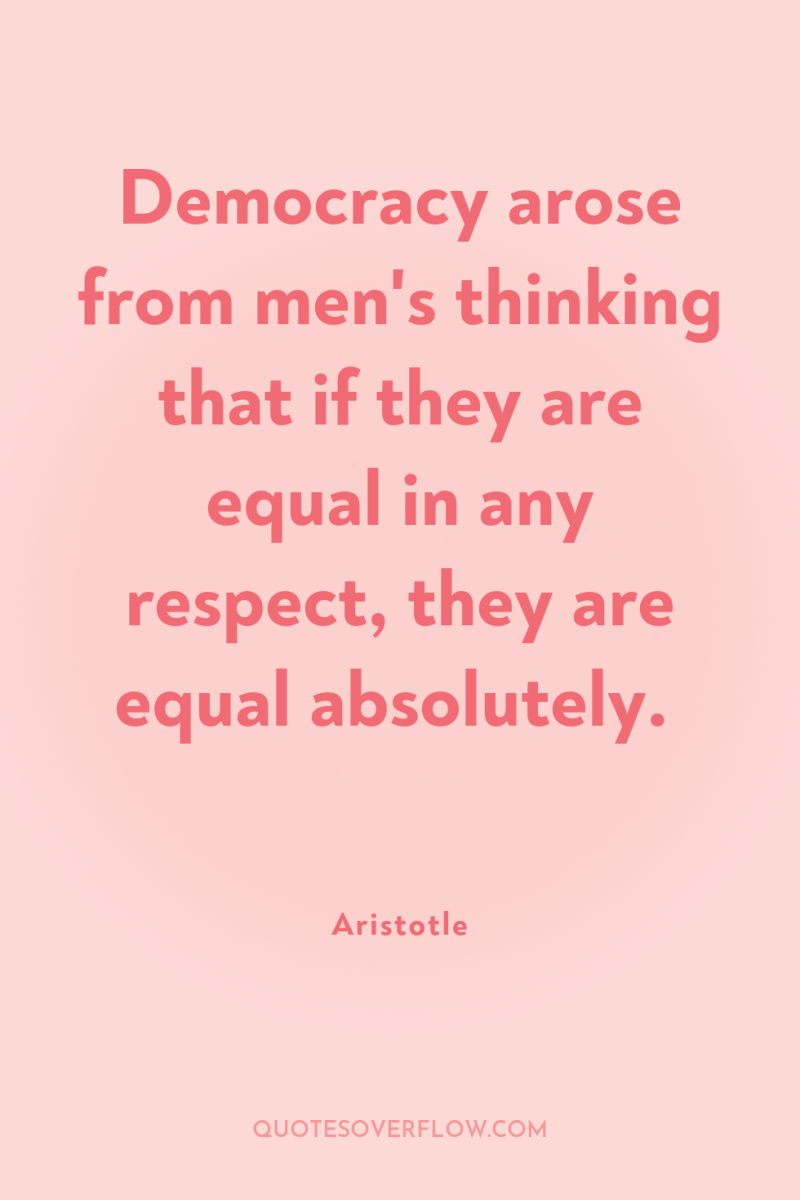
50
Democracy arose from men's thinking that if they are equal in any respect, they are equal absolutely.Aristotle
51
But of all the things which I have mentioned that which most contributes to the permanence of constitutions is the adaptation of education to the form of government, and yet in our own day this principle is universally neglected. The best laws, though sanctioned by every citizen of the state, will be of no avail unless the young are trained by habit and education in the spirit of the constitution, if the laws are democratical, democratically or oligarchically, if the laws are oligarchical. For there may be a want of self-discipline in states as well as in individuals. Now, to have been educated in the spirit of the constitution is not to perform the actions in which oligarchs or democrats delight, but those by which the existence of an oligarchy or of a democracy is made possible. Whereas among ourselves the sons of the ruling class in an oligarchy live in luxury, but the sons of the poor are hardened by exercise and toil, and hence they are both more inclined and better able to make a revolution. And in democracies of the more extreme type there has arisen a false idea of freedom which is contradictory to the true interests of the state. For two principles are characteristic of democracy, the government of the majority and freedom. Men think that what is just is equal; and that equality is the supremacy of the popular will; and that freedom means the doing what a man likes. In such democracies every one lives as he pleases, or in the words of Euripides, 'according to his fancy.' But this is all wrong; men should not think it slavery to live according to the rule of the constitution; for it is their salvation.Aristotle
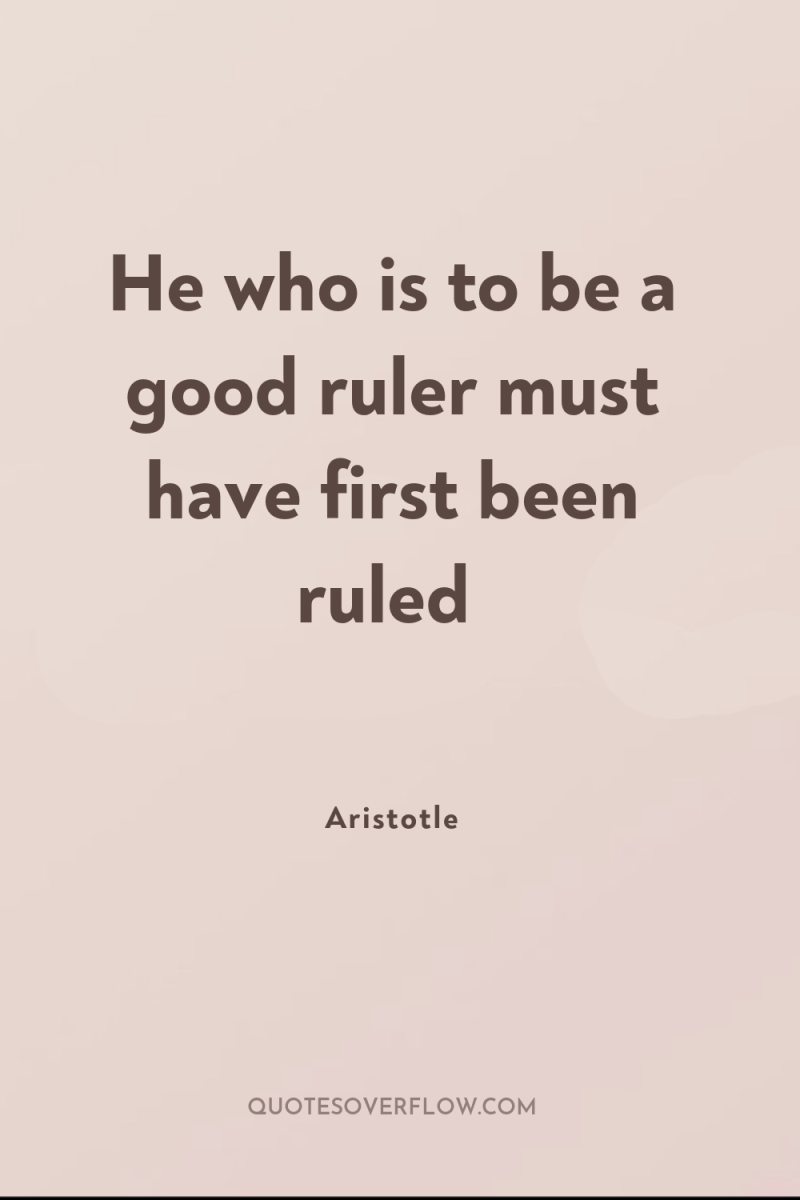
52
He who is to be a good ruler must have first been ruledAristotle
53
Neither should we forget the mean, which at the present day is lost sight of in perverted forms of government; for many practices which appear to be democratical are the ruin of democracies, and many which appear to be oligarchical are the ruin of oligarchies. Those who think that all virtue is to be found in their own party principles push matters to extremes; they do not consider that disproportion destroys a state.Aristotle
54
Neither should we forget the mean, which at the present day is lost sight of in perverted forms of government; for many practices which appear to be democratical are the ruin of democracies, and many which appear to be oligarchical are the ruin of oligarchies. Those who think that all virtue is to be found in their own party principles push matters to extremes; they do not consider that disproportion destroys a state. A nose which varies from the ideal of straightness to a hook or snub may still be of good shape and agreeable to the eye; but if the excess be very great, all symmetry is lost, and the nose at last ceases to be a nose at all on account of some excess in one direction or defect in the other; and this is true of every other part of the human body. The same law of proportion equally holds in states. Oligarchy or democracy, although a departure from the most perfect form, may yet be a good enough government, but if any one attempts to push the principles of either to an extreme, he will begin by spoiling the government and end by having none at all. Wherefore the legislator and the statesman ought to know what democratical measures save and what destroy a democracy, and what oligarchical measures save or destroy an oligarchy. For neither the one nor the other can exist or continue to exist unless both rich and poor are included in it. If equality of property is introduced, the state must of necessity take another form; for when by laws carried to excess one or other element in the state is ruined, the constitution is ruined.Aristotle
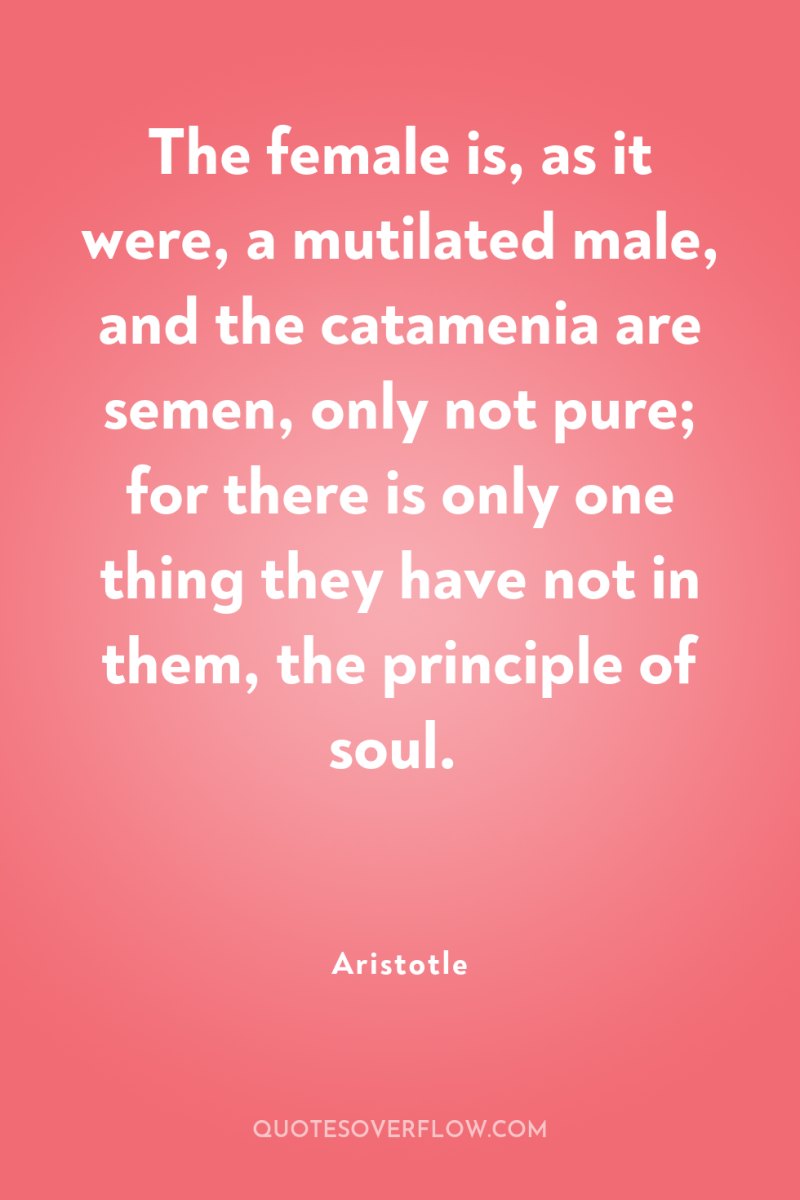
55
The female is, as it were, a mutilated male, and the catamenia are semen, only not pure; for there is only one thing they have not in them, the principle of soul.Aristotle
56
Holding as we do that, while knowledge of any kind is a thing to be honoured and prized, one kind of it may, either by reason of its greater exactness or of a higher dignity and greater wonderfulness in its objects, be more honourable and precious than another, on both accounts we should naturally be led to place in the front rank the study of the soul. The knowledge of the soul admittedly contributes greatly to the advance of truth in general, and, above all, to our understanding of Nature, for the soul is in some sense the principle of animal life. Our aim is to grasp and understand, first its essential nature, and secondly its properties; of these some are thought to be affections proper to the soul itself, while others are considered to attach to the animal owing to the presence of soul. To attain any knowledge about the soul is one of the most difficult things in the world. As the form of question which here presents itself, viz. the question 'What is it?', recurs in other fields, it might be supposed that there was some single method of inquiry applicable to all objects whose essential nature we are endeavouring to ascertain (as there *is* for incidental properties the single method of demonstration); in that case what we should have to seek for would be this unique method. But if there is no such single and general method for solving the question of essence, our task becomes still more difficult; in the case of each different subject we shall have to determine the appropriate process of investigation. If to this there be a clear answer, e.g. that the process is demonstration or division, or some other known method, many difficulties and hesitations still beset us–with what facts shall we begin the inquiry? For the facts which form the starting-points in different subjects must be different, as e.g. in the case of numbers and surfaces. First, no doubt, it is necessary to determine in which of the *summa genera* soul lies, what it *is*; is it 'a this-somewhat', a substance, or is a quale or a quantum, or some other of the remaining kinds of predicates which we have distinguished? Further, does soul belong to the class of potential existents, or is it not rather an actuality? Our answer to this question is of the greatest importance."―from_ On the Soul: Book I_ .Aristotle
57
We must consider also whether soul is divisible or is without parts, and whether it is everywhere homogeneous or not; and if not homogeneous, whether its various forms are different specifically or generically; up to the present time those who have discussed and investigated soul seem to have confined themselves to the human soul. We must be careful not to ignore the question whether soul can be defined in a single account, as is the case with animal, or whether we must not give a separate account of each sort of it, as we do for horse, dog, man, god (in the latter case the universal, animal–and so too every other common predicate–is either nothing or posterior). Further, if what exists is not a plurality of souls, but a plurality of parts of one soul, which ought we to investigate first, the whole soul or its parts? It is also a difficult problem to decide which of these parts are in nature distinct from one another. Again, which ought we to investigate first, these parts or their functions, mind or thinking, the faculty or the act of sensation, and so on? If the investigation of the functions precedes that of the parts, the further question suggests itself: ought we not before either to consider the correlative objects, e.g. of sense or thought? It seems not only useful for the discovery of the causes of the incidental proprieties of substances to be acquainted with the essential nature of those substances (as in mathematics it is useful for the understanding of the property of the equality of the interior angles of a triangle to two right angles to know the essential nature of the straight and the curved or of the line and (the plane) but also conversely, for the knowledge of the essential nature of a substance is largely promoted by an acquaintance with its properties: for, when we are able to give an account conformable to experience of all or most of the properties of a substance, we shall be in the most favourable position to say something worth saying about the essential nature of that subject: in all demonstration a definition of the essence is required as a starting point, so that definitions which do not enable us to discover the incidental properties, or which fail to facilitate even a conjecture about them, must obviously, one and all, be dialectical and futile." –from_On the Soul: Book I_ .Aristotle

58
He who cannot be a good follower cannot be a good leader.Aristotle
59
With respect to the requirement of art, the probable impossible is always preferable to the improbable possible.Aristotle
60
Pleasure in the job puts perfection in the work.Aristotle
61
Nature does nothing uselessly.Aristotle
62
Tis the mark of an educated mind to be able to entertain a thought without accepting it.Aristotle
63
Courage is the first of human qualities because it is the quality which guarantees the others.Aristotle
64
The ideal man bears the accidents of life with dignity and grace, making the best of circumstances."– AristotleAristotle
65
You will never do anything in this world without courage. It is the greatest quality of the mind next to honor. —AristotleAristotle
66
For he who lives as passion directs will not hear argument that dissuades him, nor understand it if he does; and how can we persuade one in such a state to change his ways?Aristotle
67
Hence a young man is not a proper hearer of lectures on political science; for he is inexperienced in the actions that occur in life, but its discussions start from these and are about these; and, further, since he tends to follow his passions, his study will be vain and unprofitable, because the end aimed at is not knowledge but action. And it makes no difference whether he is young in years or youthful in character; the defect does not depend on time, but on his living, and pursuing each successive object, as passion directs. For to such persons, as to the incontinent, knowledge brings no profit; but to those who desire and act in accordance with a rational principle knowledge about such matters will be of great benefit.Aristotle
68
Poverty is the parent of revolution and crime.Aristotle
69
The only stable state is the one in which all men are equal before the law.Aristotle
70
Tolerance and apathy are the last virtues of a dying society.Aristotle
71
Political society exists for the sake of noble actions, and not of mere companionship.Aristotle
72
Happiness is activity of soul.Aristotle
73
One must learn by doing the thing, for though you think you know it, you have no certainty until you try.Aristotle
74
Misfortune shows those who are not really friends.Aristotle
75
In poverty and other misfortunes of life, true friends are a sure refuge. The young they keep out of mischief; to the old they are a comfort and aid in their weakness, and those in the prime of life they incite to noble deeds.Aristotle
76
The ideal man, takes joy in doing favours for others; but he feels ashamed to have others do favours for him. For it is a mark of superiority to confer a kindness; but it is a mark of inferiority to receive it.Aristotle
77
Nor is he liberal who gives with pain; for he would prefer the wealth to the noble act, and this is not characteristic of a liberal man. But no more will the liberal man take from wrong sources; for such taking is not characteristic of the man who sets no store by wealth.Aristotle
78
The beauty of the soul shines out when a man bears with composure one heavy mischance after another, not because he does not feel them, but because he is a man of high and heroic temper.Aristotle
79
Men do not become tyrants in order that they may not suffer cold.Aristotle
80
For there are two reasons why human beings face danger calmly: they may have no experience of it, or they may have means to deal with it: thus when in danger at sea people may feel confident about what will happen either because they have no experience of bad weather, or because their experience gives them the means of dealing with it.Aristotle
81
It is of the nature of desire not to be satisfied, and most men live only for the gratification of it.Aristotle
82
It is also in the interests of the tyrant to make his subjects poor... the people are so occupied with their daily tasks that they have no time for plotting.Aristotle
83
Those who know, do. Those that understand, teach.Aristotle
84
It is a part of probability that many improbabilities will happen.Aristotle
85
All human actions have one or more of these seven causes: chance, nature, compulsion, habit, reason, passion, and desire.Aristotle
86
It is well said, then, that it is by doing just acts that the just man is produced, and by doing temperate acts the temperate man; without doing these no one would have even a prospect of becoming good.Aristotle
87
Anybody can become angry – that is easy, but to be angry with the right person and to the right degree and at the right time and for the right purpose, and in the right way – that is not within everybody's power and is not easy.Aristotle
88
Anyone can get angry, but to do this to the right person, to the right extent, at the right time, with the right motive, and in the right way, that is not for everyone, nor is it easy.Aristotle
89
Those who are not angry at the things they should be angry at are thought to be fools, and so are those who are not angry in the right way, at the right time, or with the right persons.Aristotle
90
We must not listen to those who advise us 'being men to think human thoughts, and being mortal to think mortal thoughts' but must put on immortality as much as possible and strain every nerve to live according to that best part of us, which, being small in bulk, yet much more in its power and honour surpasses all else.Aristotle
91
All persons ought to endeavor to follow what is right, and not what is established.Aristotle
92
Character may almost be called the most effective means of persuasion.Aristotle
93
In a democracy the poor will have more power than the rich, because there are more of them, and the will of the majority is supreme. &It is also in the interests of a tyrant to keep his people poor, so that they may not be able to afford the cost of protecting themselves by arms and be so occupied with their daily tasks that they have no time for rebellion.Aristotle
94
Of all the varieties of virtues, liberalism is the most beloved.Aristotle
95
We shall learn the qualities of governments in the same way as we learn the qualities of individuals, since they are revealed in their deliberate acts of choice; and these are determined by the end that inspires them.Aristotle
96
Equity bids us be merciful to the weakness of human nature; to think less about the laws than about the man who framed them, and less about what he said than about what he meant; not to consider the actions of the accused so much as his intentions; nor this or that detail so much as the whole story; to ask not what a man is now but what he has always or usually been.Aristotle
97
It is not always the same thing to be a good man and a good citizen.Aristotle
98
We maintain, therefore, that the first essential, the life and soul, so to speak, of Tragedy is the Plot; and that the Characters come second–compare the parallel in painting, where the most beautiful colours laid on without order will not give one the same pleasure as a simple black-and-white sketch of a portrait.Aristotle
99
The end toward which all human acts are directed is happiness.Aristotle
100
The saddest of all tragedies - the wasted lifeAristotle